Cooperative News
- Celebrating Community at the Camden Christmas Parade
- Powering Community: Ouachita Electric’s Cooperative Month Highlights
- Alexander receives Lineman Scholarship
- Member-Owned, Service-Driven: How Your Cooperative Works for You
- Small Change Can Make a BIG Difference
- Energy Mysteries Solved: Invisible Factors that Contribute to High Energy Use
- Ouachita Electric Hosts Community Cookout at Hogskin Holidays 2025
- Thank You, Linemen: Celebrating Our Own at Lineworker Appreciation Day
- Thank You, Smackover! OECC Shares Careers in Energy with Future Leaders
- 2025 Youth Tour Delegates Selected
- Tree Trimming Ensures Reliable Service
- Strickland, Estridge Volunteer As SeaPerch Judges
- Safety Demonstration at Bearden High School
- Ouachita Electric Linemen Lend a Helping Hand
- Annual Meeting Official Notice
- Offices will be closed on Good Friday, April 18
- Ouachita Electric Employees and Board Attend Farm Bureau Legislative Breakfast
- Congratulations to Justin Horstkamp on Completing the Power Delivery Program
- ATTENTION OECC MEMBERS - CREWS AT WORK
- Lineworker Scholarship Applications Now Open
- Andrea Turner Retires After Over 25 Years
- Be Ready for Storm Season: Preparedness is the Best Defense for Severe Weather
- Stay Connected! Update Your Contact Information Today
- Hogskin Holidays Festival Returns April 5-12!
- Understanding Your High Electric Bill: Key Factors and Solutions
- Regina Hogan Retires After 24 Years
- Youth Tour: A Charged-Up Adventure! Experience An Unforgettable Week in Our Nation’s Capital and Philadelphia
- Factors that Impact Energy Bills
- Energy Bills ‘Boil’ Down to One Thing — Heat
- Spreading Holiday Cheer: Ouachita Electric Employees Give Back Through Angel Tree Program
- Celebrating Dedication: Ouachita Electric Honors Employees at Annual Christmas Party
- Christmas Card Contest Winners Announced
- The Fast-Growing Demand for Electricity
- Ouachita Electric Director Receives Award
- Christmas Card Winners
- Youth Leadership Spotlight: Emma Tuberville Highlights Land Ownership Challenges for Arkansas Electric Cooperatives
- Kelly Belt Appointed as Director for District 2
- Public Notice of Rate Adjustment
- Congratulations to Sheila Johnson on Earning Credentialed Cooperative Director Certification!
- Ouachita Electric Brings Willie Wiredhand to Downtown Camden: Congrats to Prize Winner Kylie Burchfield!
- Ouachita Electric’s Youth Delegate Leads Community Food Drive to Support Local Children
- Capital Credits Returned to Members
- Ouachita Electric Stands Together for Breast Cancer Awareness Month – Honoring Strength and Support!
- Family Fun Day at Ouachita County Sheriff's Office
- Capture the Moment with Willie Wirehand in Downtown Camden – Enter to Win!
- Join Ouachita Electric at the 2024 Boo Bash Camden's Night Out – Candy, Fun, and Community!
- October is National Co-op Month
- In Memory of Jim Garner
- Ouachita Electric and Scott Davis Bring Electrical Safety Magic Show to Local Elementary Schools
- Go Above and Beyond for a Safe Harvest
- Board Members Attend State Conference
- Electrical Safety Tips for Hunters
- EPA Rule Threatens Electric Reliability
- Watch the Clock to Lock in Energy Savings
- Ouachita Electric Youth Tour Delegate Chosen as State Representative
- Ouachita Electric Board Members Prioritize Growth and Education, Celebrating Emma Tuberville's Historic Achievements
- LIHEAP offers cooling assistance
- 10 Things You Might Not Know About Power Restoration
- Update on Lockbox Payment Processing Address
- Frankie Burchfield retires after 45 years
- Orlando Coon retires after 25 years
- OECC Economic Impact Analysis
- Annual Meeting Held, Directors Elected
December 10, 2025
Celebrating Community at the Camden Christmas Parade
It was a privilege to join our neighbors in the annual Camden Christmas Parade. Events like these remind us of the importance of connection and community during the holiday season.
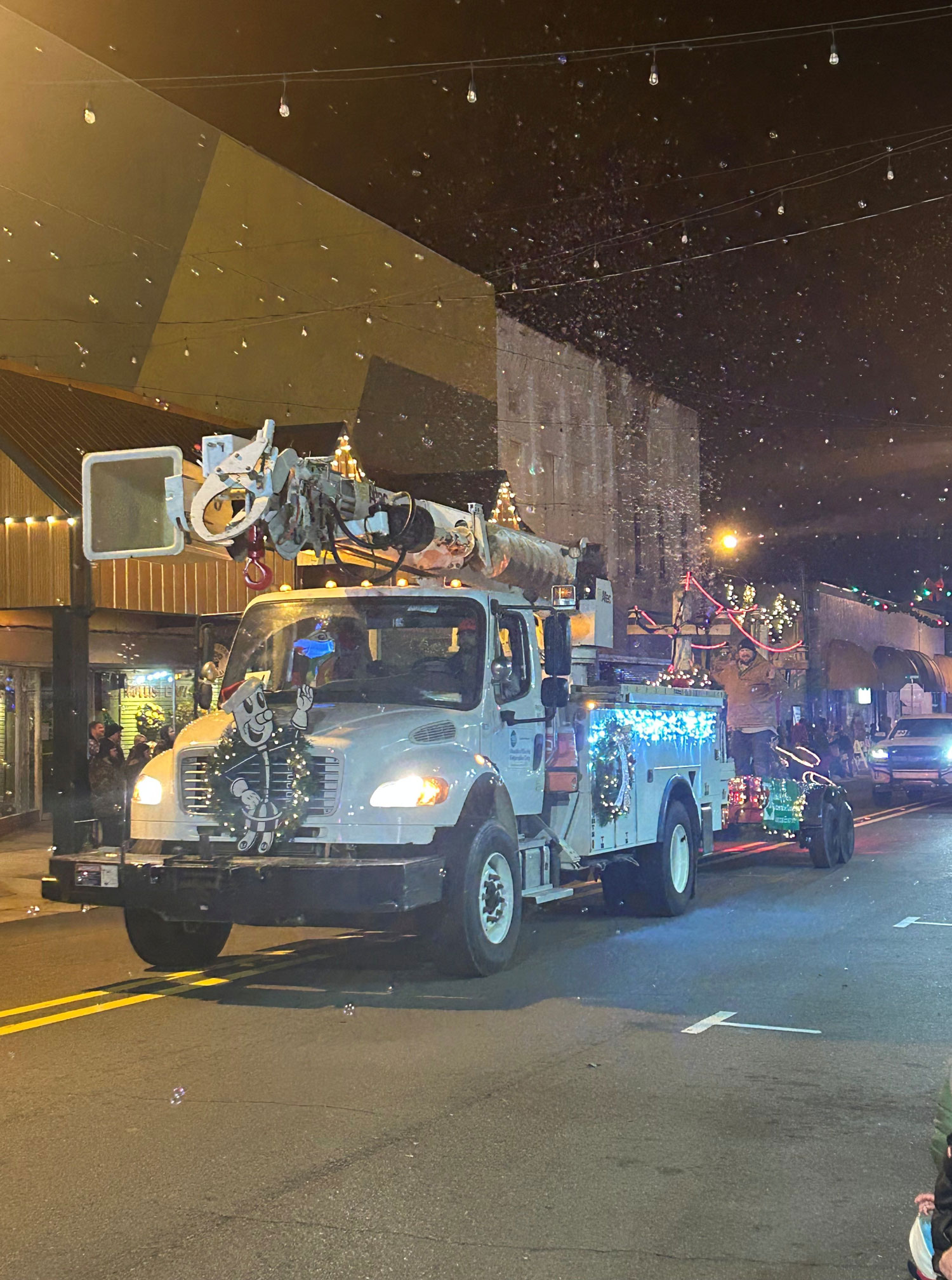 |
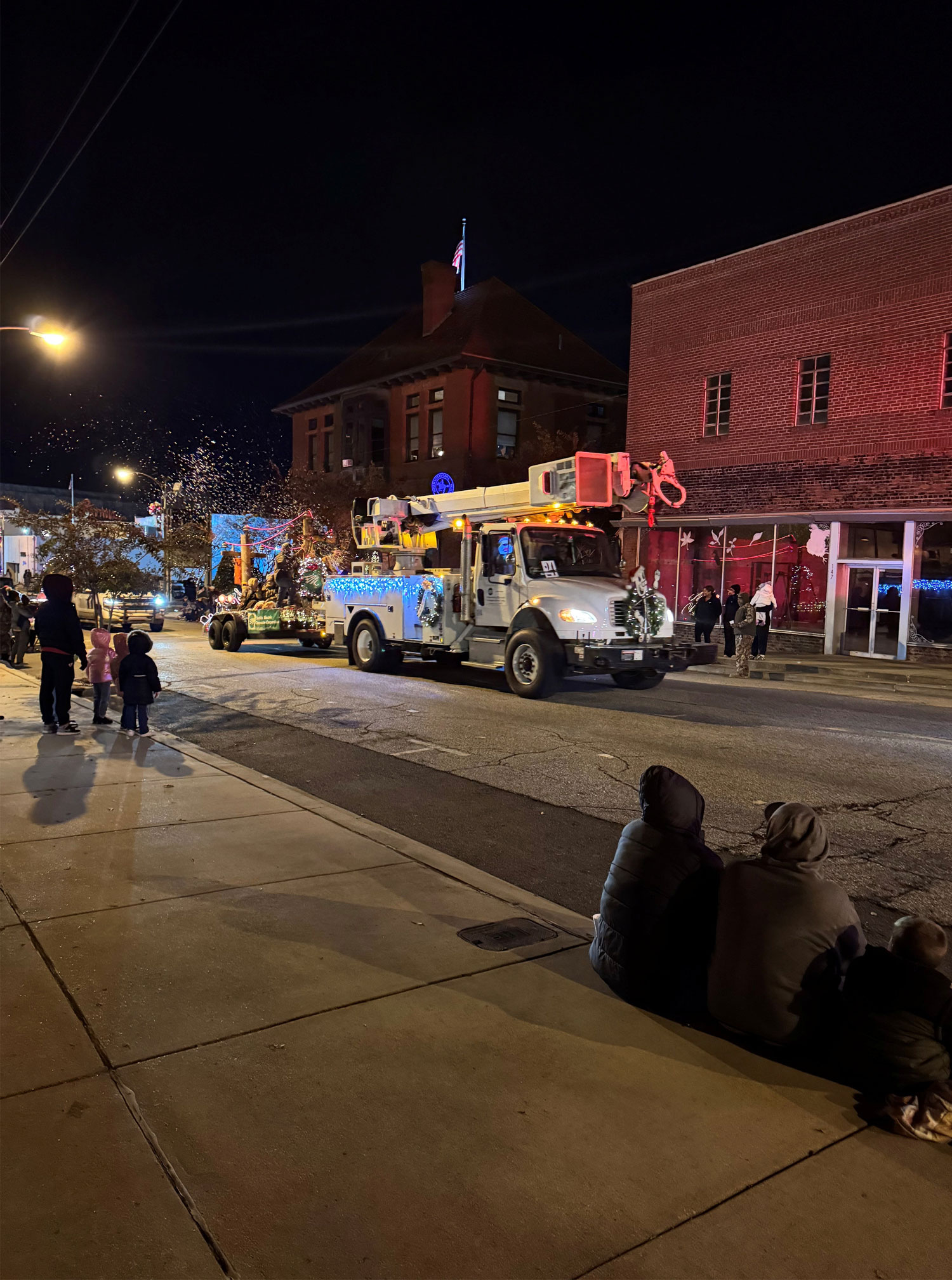 |
.jpg) |
|
November 10, 2025
Powering Community: Ouachita Electric’s Cooperative Month Highlights
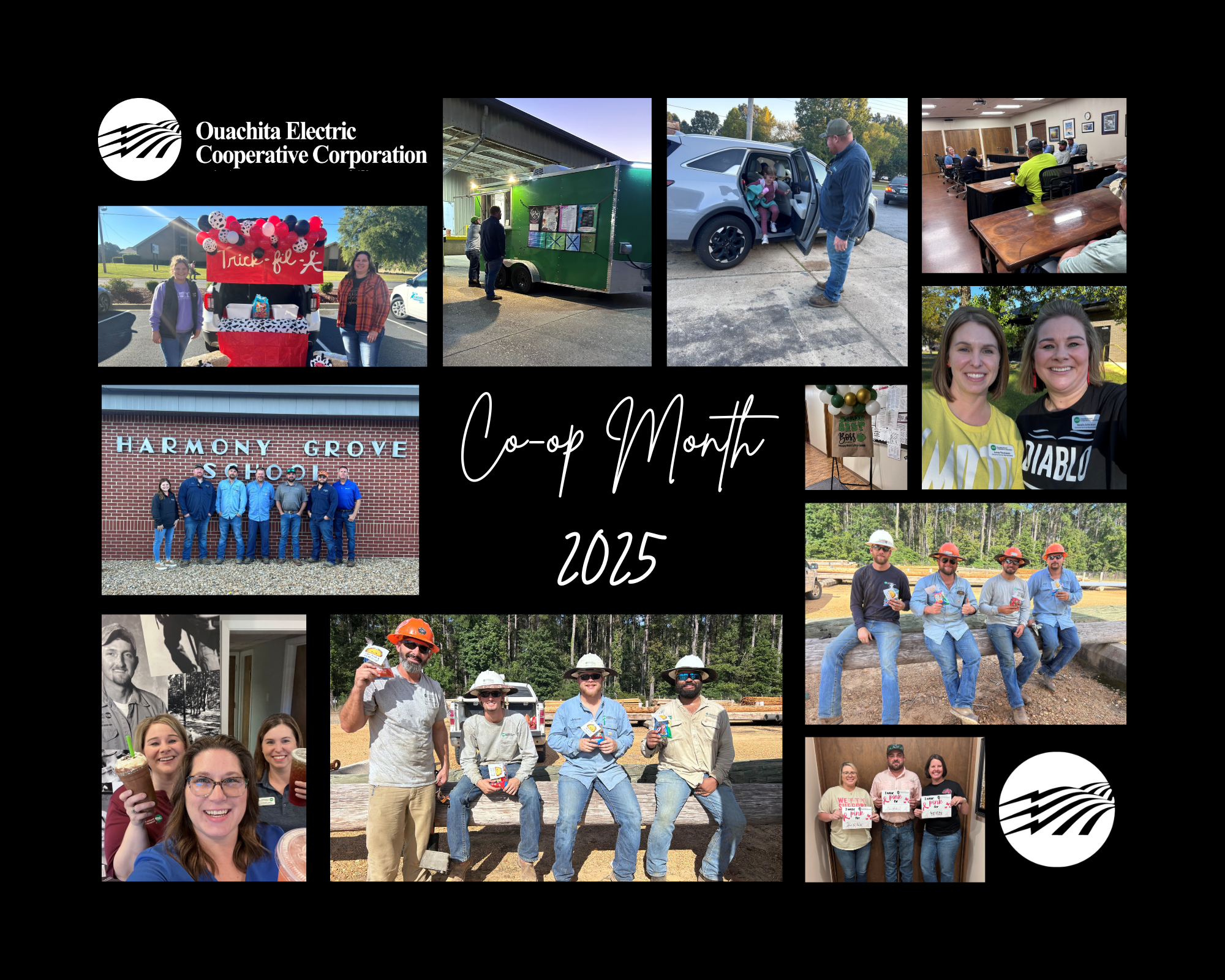
This year, Ouachita Electric had a blast celebrating Cooperative Month!
We filled October with activities that reminded us what being part of a cooperative is all about—teamwork, community, and having a little fun along the way.
Inside the co-op, our linemen refreshed their skills with pole-top rescue training and were treated to goodie bags as a small token of appreciation for their hard work. Employees also enjoyed a visit from a local coffee truck (because who doesn’t love a mid-morning caffeine boost?) and gathered for our first-ever “Dip Day,” where everyone brought their favorite dip to share—it was a huge hit!
Out in the community, our crews kicked off the month by greeting students and families at Harmony Grove Elementary during morning drop-off, helping brighten the start of their school day. We also showed our support for Breast Cancer Awareness Month by proudly wearing pink, and we wrapped up the month by joining in several local Halloween events. Seeing all the smiles and laughter reminded us how special it is to serve our community.
We’re already looking forward to next year’s celebration and finding even more ways to give back, connect, and have fun together!
June 13, 2025
Alexander receives Lineman Scholarship
Ouachita Electric is pleased to offer a scholarship covering books and tuition for a candidate selected to attend the High Voltage Lineman Technology program at Arkansas State University-Newport this fall. This year's scholarship recipient is Joe Alexander, III from Camden Fairview High School. Congratulations, Joe!
 |
Ouachita Electric Marketing and Communications Specialist Sabrina Estridge presents Joe Alexander with the Lineman Scholarship. |
May 5, 2025
Member-Owned, Service-Driven: How Your Cooperative Works for You
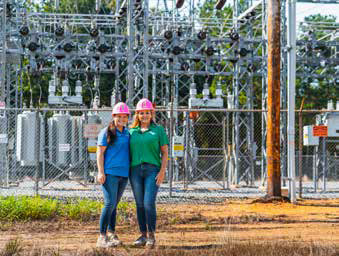 |
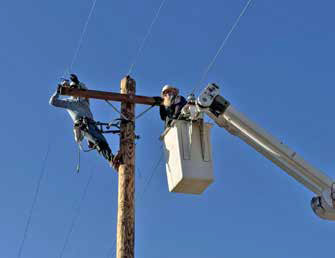 |
By: Shawn Dorflinger, Manager
“We’re here to serve you.” We’ve all heard this phrase countless times. These words may sound generic, but to us, they mean everything.
Ouachita Electric Cooperative was created to serve our community.
Back in the day, neighbors banded together and formed our co-op for the common good. In our case, it was the only way the community could bring electricity to the area where there was none. In doing so, we helped the community thrive. That mission-focused heritage is the golden thread that is woven throughout our history.
We still continue to power the community. While our focus has remained steady on providing reliable energy to our members, today’s energy landscape and consumer expectations are far different than they were decades ago. That’s why we’re adapting, to keep pace with changing technology, evolving needs and new expectations.
A fundamental aspect of our commitment to service stems from our unique member-owned business model. Unlike investor-owned utilities, electric cooperatives are run by and for the members we serve. This means that your neighbors, family and friends are the ones making decisions that directly impact your community. As a member, you have a voice through your vote at the annual meeting, ensuring that your concerns and priorities are heard.
Furthermore, any profits generated by the cooperative are returned to you, the members, in the form of capital credits. These credits represent your share of the cooperative's equity and are a tangible benefit of being a member-owner. This member-focused model fosters a sense of community and ensures that our focus remains squarely on providing reliable, affordable and responsible power to those we serve.
Serving as your trusted energy adviser means we want to help you save energy (and money) and provide information on a broad range of energy topics. Consider scheduling a free energy audit with one of our energy experts to identify ways you can save energy at home. Understanding how your home uses energy can help determine the best ways to modify energy use and keep more money in your wallet.
Service is deeply ingrained into who we are. We continue to evolve with the times, and in return, we’ve found additional ways to serve you and provide more options for you to power your life.
We’re member-owned and service-driven. And we’re here whenever you need us. Connect with us online, in person, through the mobile app or via our social media channels. However you choose to connect, please let us know how we can serve you better.
May 5, 2025
Small Change Can Make a BIG Difference

Since Ouachita Electric Cooperative was formed in 1938, we have been dedicated to helping the people in Bradley, Calhoun, Dallas, Nevada and Ouachita counties live better lives, not only with affordable electric power, but through our involvement in a number of important community endeavors.
Now with Operation Round Up, an innovative community service fundraising program, we can share a simple and rewarding way for Ouachita Electric members to help support worthwhile projects in our service areas.
Operation Round Up is just what the name implies. Each month, Ouachita Electric simply “rounds up” the electric bill of participating members to the next highest dollar. For example, a member’s monthly bill of $52.73 would be automatically rounded up to $53, with the additional 27 cents going to the Operation Round Up fund. This program will never cost the contributor more than 99 cents a month. Donations are tax deductible, and members will be sent a summary of their yearly contributions in December and January.
Community spirit. Service. Good will. Operation Round Up is an exciting extension of Ouachita Electric's commitment to our members. Members can sign-up with our online form at oecc.com/operation-roundup#form or contact any Ouachita Electric Cooperative office about this program.
May 5, 2025
Energy Mysteries Solved: Invisible Factors that Contribute to High Energy Use
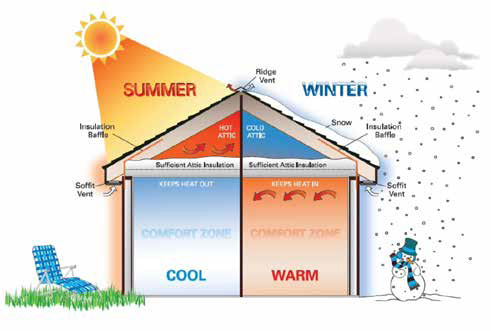 By: Mitch Ross
By: Mitch Ross
My wife and I have been watching a suspenseful TV show lately. Each episode keeps us hooked by hinting at things but leaving circumstances and plotlines a mystery. We never quite know the whole picture of what is going on or where the tale is headed.
There is something human about enjoying sensations of anxiety, anticipation and uncertainty through our favorite characters. But when it comes to our expenses, we'd rather avoid those feelings. So, why do they surface with our energy bills?
Although we are blessed here in Arkansas with kilowatt-hour rates much lower than the national average, sometimes, we can experience a jolt when we receive our monthly bills. However, understanding and considering two invisible factors can take some of the suspense out of our energy costs.
The two invisible factors are air and heat:
Air: The largest portion of a typical home’s energy use is heating and cooling. Our HVAC systems blow out hot or cold air, and where this air ends up has a huge impact on our energy bills. If we have leaky ducts, we might be spilling air into the crawlspace or attic. If we have issues with our home’s air barrier, we are pulling unconditioned air into our home. Leaky ducts and gaps in your home’s air barrier waste energy by letting conditioned air escape and unconditioned air enter your home. This forces your HVAC system to work harder, raising your energy bills. Sealing these leaks helps reduce costs.
Heat: As stated in a previous article, 95% of our energy bill ends up dealing directly with either creating or moving heat. HVAC systems are just moving around or creating heat. Refrigerators and freezers are machines that remove heat from inside of the unit. Other appliances and devices mostly use energy to transport or create heat as well, sometimes as an undesired byproduct.
Solve the energy mysteries by:
- Sealing air leaks and insulating ducts.
- Properly insulating attic space.
- Scheduling regular HVAC maintenance.
- Consistently changing air filters.
- Upgrading older appliances with more energy-efficient ones.
- Lowering water heater temperature to 120 degrees.
By continuing to visualize how energy is used in our homes, we can take some of the suspense out of our monthly bills and even learn to lower them!
Mitch Ross is the energy efficiency manager for the Electric Cooperatives of Arkansas.
April 15, 2025
Ouachita Electric Hosts Community Cookout at Hogskin Holidays 2025
Ouachita Electric served hamburgers to the Calhoun County Community during the 2025 Hogskin Holidays Festivities.
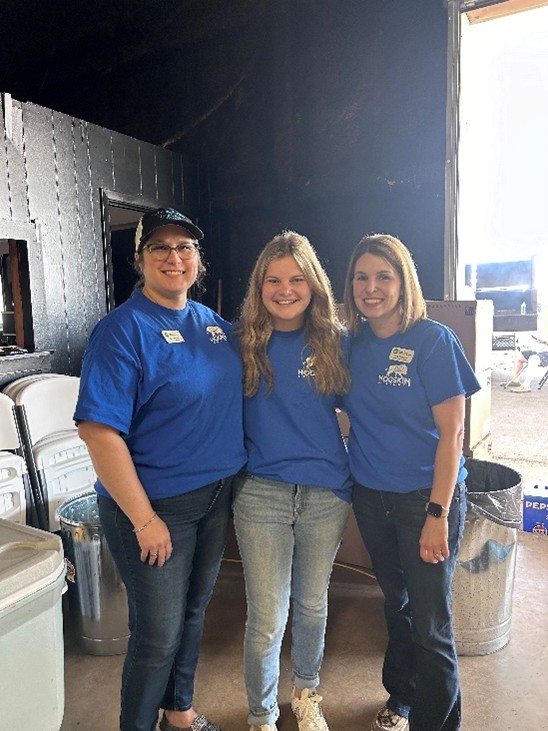 |
 |
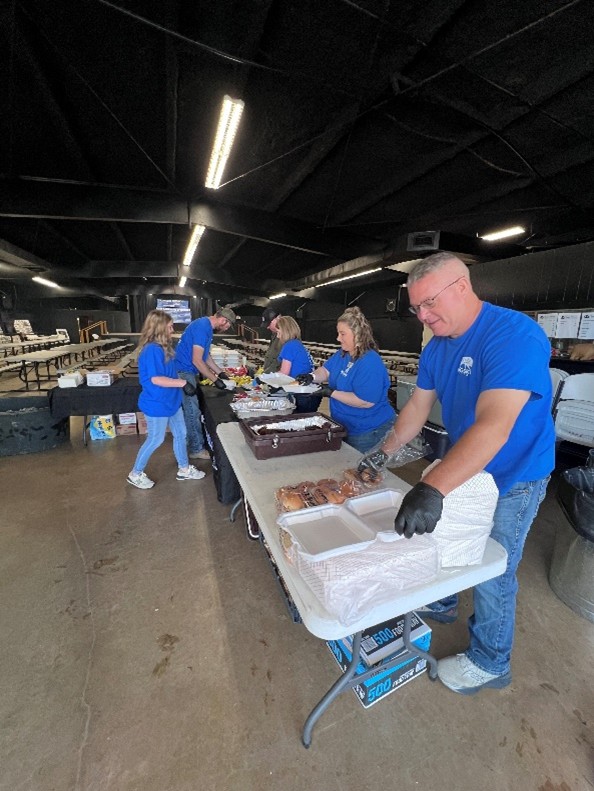 |
April 15, 2025
Thank You, Linemen: Celebrating Our Own at Lineworker Appreciation Day
Four Ouachita Electric Linemen attended the Arkansas Lineworker Appreciation Day at the state capital. Thank you, Ethan Jordan, Austin McDonald, Eric McGee, and James Steed for representing south Arkansas.
 |
 |
 |
April 15, 2025
Thank You, Smackover! OECC Shares Careers in Energy with Future Leaders
Ouachita Electric participated in Smackover Elementary School career day events Friday, April 11th. Thank you Smackover School District for the invite!
 |
 |
April 8, 2025
2025 Youth Tour Delegates Selected

Ouachita Electric is pleased to announce the 2025 Youth Tour Delegates. Mary Miller, Braden Dunn, and Gracey Crawford will represent Ouachita Electric in Washington D.C. on the Electric Cooperatives of Arkansas Youth Tour.
April 4, 2025
Tree Trimming Ensures Reliable Service

Trees and power lines are a tricky combination. Without regular maintenance, they can become a real problem, especially during the growing season. That’s why you’ll see our crews out in the community, proactively trimming trees around power lines. This work is essential for keeping your lights on and ensuring a safe, reliable power supply.
Here’s why it matters:
- Fewer Power Outages: Keeping tree limbs away from power lines is the best way to prevent outages, especially during storms or periods of rapid tree growth. This means fewer disruptions to your service.
- Faster Repairs: When outages do happen, clear lines allow our crews to access and repair damaged equipment quickly. This gets your power back on faster.
- Safety First: Tree trimming protects both our crews and the public from potential hazards like falling limbs, contact with live wires and even fires caused by vegetation touching power lines. It’s about everyone’s safety.
- Saving You Money: Regular maintenance is much more cost-effective than dealing with emergency repairs after a major outage.
- Protecting Wildlife: While we try to preserve trees whenever possible, trimming creates a safer environment for wildlife by reducing the risk of animals coming into contact with power lines.
- A More Beautiful Community: Maintaining clearances around power lines improves the appearance of our community and prevents overgrown vegetation from becoming a nuisance.
You can also help us maintain a safe and reliable power system by being mindful when planting trees on your own property. When planting new trees, it’s important to consider their mature size and proximity to power lines. Large trees planted too close to power lines can create safety hazards and increase the likelihood of outages.
If you see a tree limb or an entire tree that has fallen onto a power line, please do not approach it. These situations are extremely dangerous. Instead, contact our office immediately at (877) 252-4538 to report the issue. Our crews will be dispatched to assess the situation and make the area safe.
Our tree trimming program is a vital part of our commitment to providing responsible, affordable and reliable power. It’s an investment in preventing problems before they happen and ensuring a dependable power supply for everyone.
Thank you for your understanding and cooperation as we work to maintain our electric system.
April 4, 2025
Strickland, Estridge Volunteer As SeaPerch Judges
|
Kari Strickland and Sabrina Estridge attended the 2025 SeaPerch competition where they volunteered as judges. The Electric Cooperatives of Arkansas sponsors this competition. |
 |
April 4, 2025
Safety Demonstration at Bearden High School
|
Greg Strickland conducted a safety demonstration at the Bearden High School STEM night in March. |
 |
April 4, 2025
Ouachita Electric Linemen Lend a Helping Hand
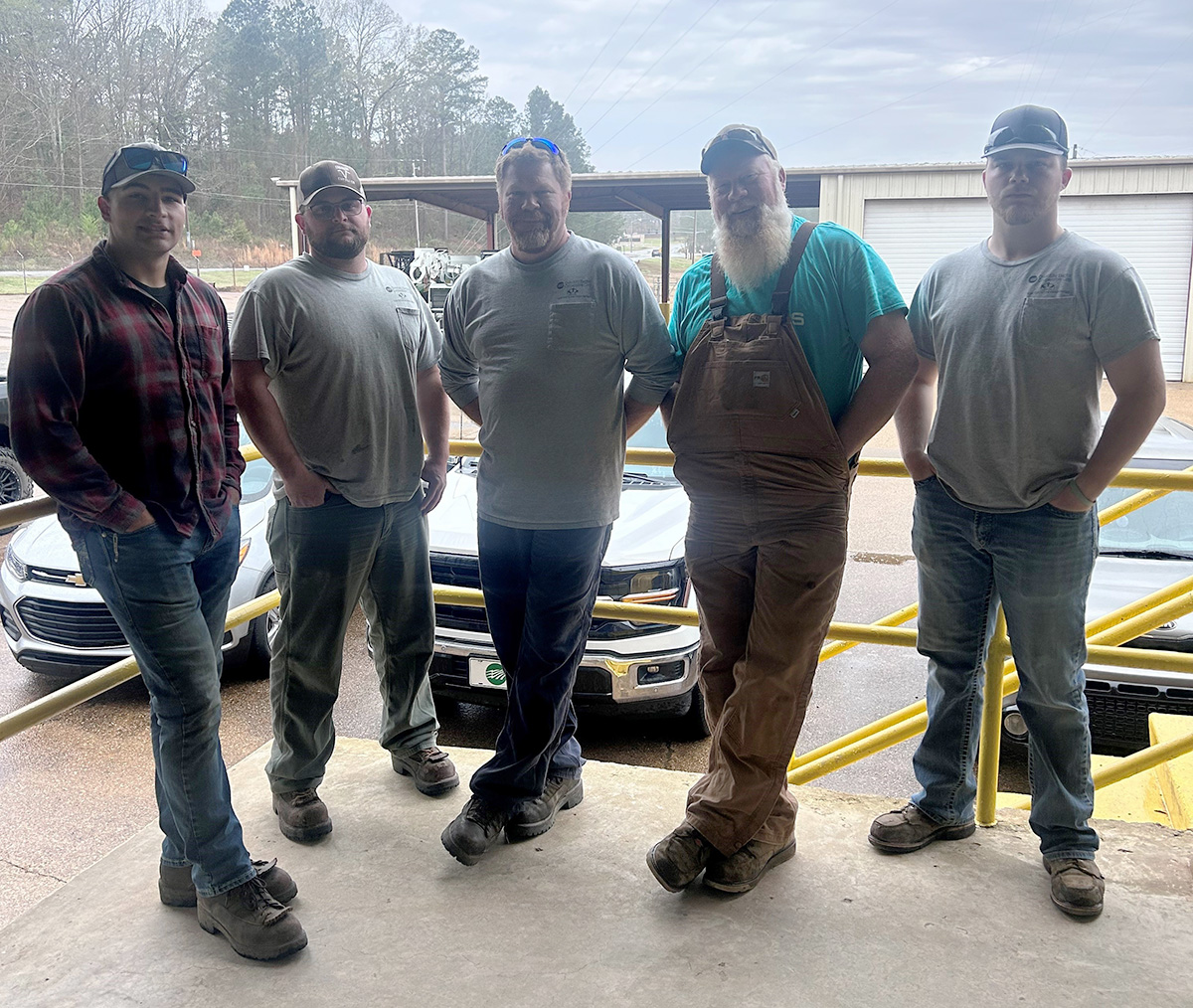 Five Ouachita Electric Linemen went to Newport to assists Farmers Electric after the March tornados. Thank you Ethan Jordan, James Steed, Troy Carter, Chad Davis, and Jemison McPherson, for your dedication to the cooperative community.
Five Ouachita Electric Linemen went to Newport to assists Farmers Electric after the March tornados. Thank you Ethan Jordan, James Steed, Troy Carter, Chad Davis, and Jemison McPherson, for your dedication to the cooperative community.
April 4, 2025
Annual Meeting Official Notice
Notice is hereby given that the Annual Membership Meeting of Ouachita Electric Cooperative Corporation will be held on Thursday, June 26, at the headquarters in Camden, beginning at 6 p.m., for the following purposes:
-
To pass on reports for the previous fiscal year;
-
To elect three directors for the cooperative (Districts No. 1, 2 and 3), to serve a term of three years each; and,
-
To transact such other business as may properly come before the meeting.
OECC members interested in becoming candidates for the 2025 directorial election for Districts 1, 2 and 3 may come to the Camden headquarters and pick up a petition and information packet. We ask that potential candidates pick up the packets in person so that we may verify eligibility at that time.
OECC Board Districts with Directorial Terms ending June 26:
| District | County | Territory |
|
No. 1 Walt Pigott |
Dallas | All of the cooperative’s territory in Dallas County. |
|
No. 2 Kelly Belt |
Ouachita | All of the cooperative’s territory South of Hwy 278 and West of Hwy 7 to its point of intersection with Hwy 376, and then West of Hwy 376, except that which is in Nevada County. |
|
No. 3 Lisa Hendrix |
Calhoun | All of the cooperative’s territory situated within the following boundary lines: Commence at a point on the East boundary line of Calhoun County where it joins Bradley County and is the Northeast corner of the cooperative’s territory in Calhoun County and run South along the boundary line between Calhoun and Bradley Counties to a point of intersection with Hwy 160, then run Northwesterly along Hwy 160 to a point of intersection with Arkansas Hwy 172 and run Westerly along Arkansas Hwy 172 to a point of intersection with U.S. Hwy 167, then run North on U.S. Hwy 167 to a point of intersection with U.S. Hwy 278, then run West along U.S. Hwy 278 to a point of intersection with Calhoun County Road No. 5, then run Northerly along Calhoun County Road No. 5 to a point of intersection with Arkansas Hwy 274 and Arkansas Hwy 203 and run thence Northerly along Arkansas Hwy 203 to Two Bayou Creek, then run Northeasterly along Two Bayou Creek to the North line of the territory, then follow the North line as it meanders Easterly back to the point of beginning. |
March 18, 2025
Offices will be closed on Good Friday, April 18

March 12, 2025
Ouachita Electric Employees and Board Attend Farm Bureau Legislative Breakfast
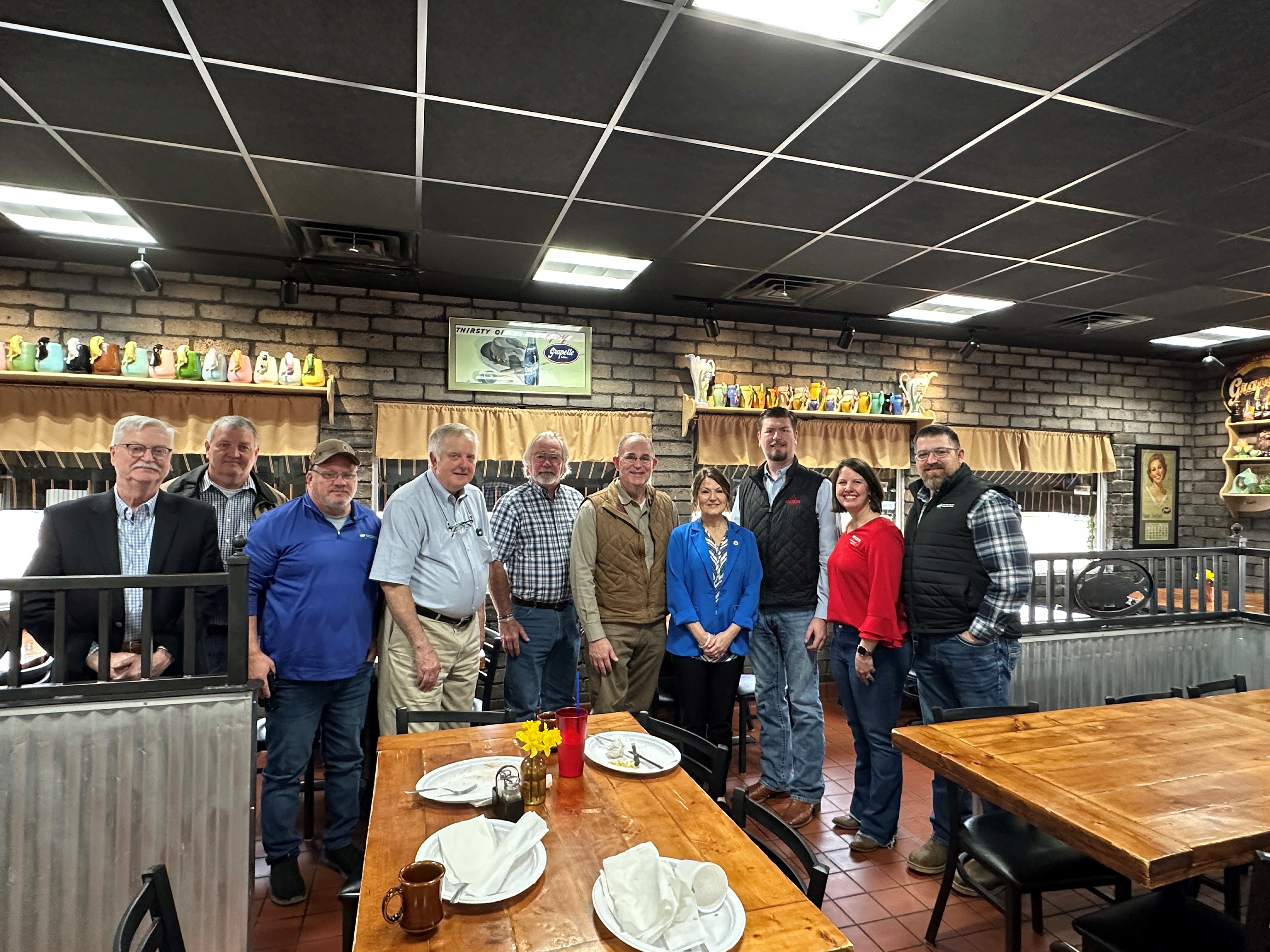
Last week, employees of Ouachita Electric, along with members of the Board of Directors, attended the Farm Bureau Legislative Breakfast held at Woods Place.
We extend our gratitude to our local representatives for their ongoing contributions to the state of Arkansas.
March 12, 2025
Congratulations to Justin Horstkamp on Completing the Power Delivery Program
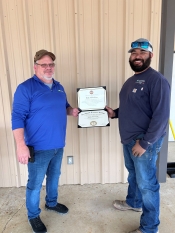 Congratulations to Justin Horstkamp, our lead lineman for the Hampton district, on completing the Power Delivery Program at Northwest Lineman College.
Congratulations to Justin Horstkamp, our lead lineman for the Hampton district, on completing the Power Delivery Program at Northwest Lineman College.
March 6, 2025
ATTENTION OECC MEMBERS - CREWS AT WORK
.png)
March 5, 2025
Lineworker Scholarship Applications Now Open
|
Ouachita Electric is offering a scholarship to cover books and tuition for the candidate chosen to attend the High Voltage Lineman Technology program at Arkansas State University-Newport this fall. Applicants must be current members (or the child of a current member) of Ouachita Electric to be eligible. Those interested in applying for the scholarship should pick up an application at OECC’s Camden or Hampton offices or download. Please return the completed form in person or by email to Angie McLendon before the April 11 This is a 36-semester credit hour program consisting of 12 hours of general education courses. The remaining 24 hours will involve coursework and hands-on training. In the final semester, students will complete an internship at their local electric cooperative as their capstone course. |
_f400x336_1741189409.jpg) |
|
|
|
March 5, 2025
Andrea Turner Retires After Over 25 Years
|
We extend our heartfelt congratulations to Andrea Turner on her retirement from Ouachita Electric after 25 and a half years of dedicated service. Andrea began her career at Ouachita Electric in 1999 as a member service representative, making significant contributions until her retirement in 2025. When reflecting on her time with the cooperative, Andrea shared, “There are just so many” cherished memories. Among her favorites are the remarkable day a black bear ventured into the drive-thru, the regular visits from members and the moments when individuals reached out to her for prayers during challenging times. When asked what the cooperative means to her, Andrea stated, “The cooperative means loyalty, friendship and family. If you had told me when I started working here in 1999 that I would be here for 25 years, I would not have believed you. However, I have been blessed to say that I have genuinely enjoyed being a part of the Ouachita Electric family.” We express our gratitude to Andrea for her exceptional service at Ouachita Electric. Her positive influence on the cooperative will be greatly missed, and we wish her all the best in her future endeavors. We invite our community to join us for Andrea's retirement party on Friday, March 7, from 1-3 p.m. at our Hampton warehouse. Please come and celebrate Andrea's hard work and dedication! |
 |
March 5, 2025
Be Ready for Storm Season: Preparedness is the Best Defense for Severe Weather
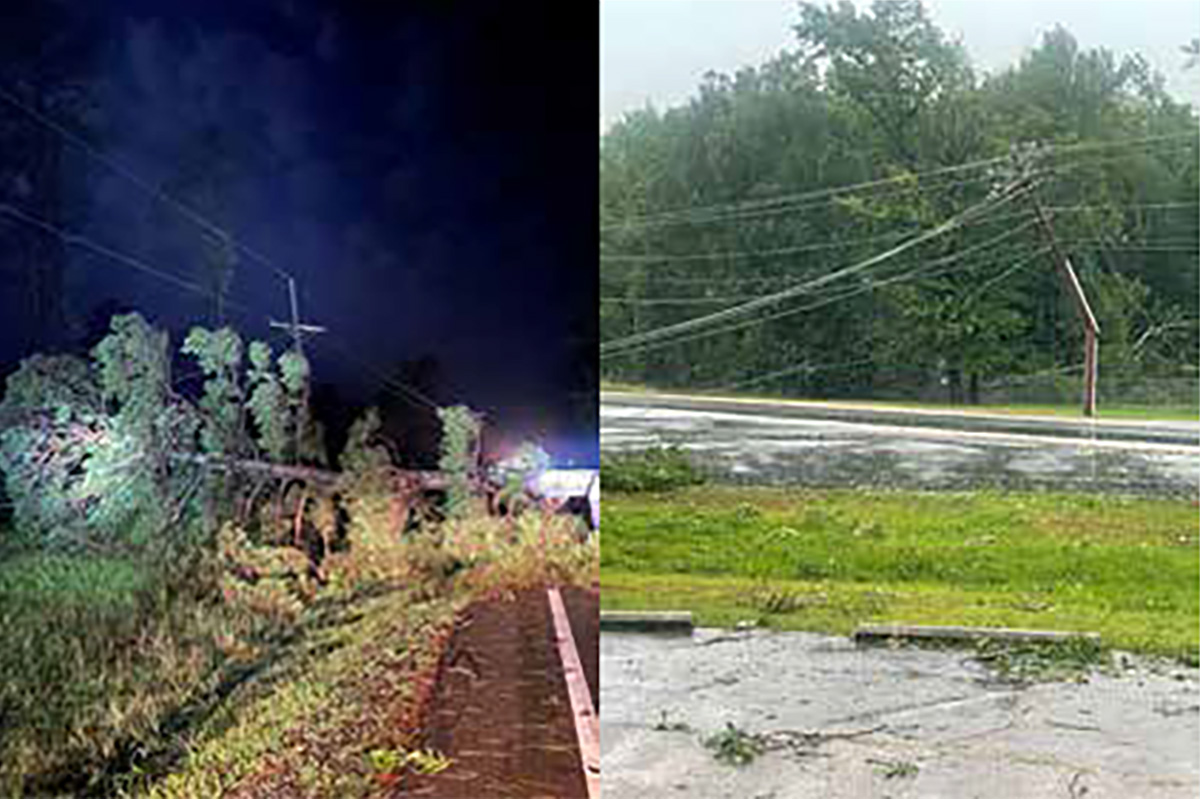
Springtime brings many favorite activities like cooking outdoors, working in the yard or garden and simply slowing down a bit
to enjoy life. Unfortunately, spring and summer can also create the perfect conditions for severe storms.
Ouachita Electric crews are always prepared and standing by to respond should power outages occur in our area. When severe storms cause power disruptions, our line crews take all necessary precautions before they get to work on any downed lines.
The Federal Emergency Management Agency (FEMA) recommends the items below as a starting point for storm and disaster preparedness.
- Stock your pantry with a three-day supply of nonperishable food, including canned goods, energy bars, peanut butter, powdered milk, instant coffee, water and other essentials (such as diapers and toiletries).
- Confirm that you have adequate sanitation and hygiene supplies, including towelettes, soap and hand sanitizer.
- Ensure your First Aid kit is stocked with pain relievers, bandages and other medical essentials, and make sure your prescriptions are current.
- Set aside basic household items you will need, including flashlights, batteries, a manual can opener and portable, battery-powered radio or TV.
- Organize emergency supplies so they are easily accessible in one location.
In the event of a prolonged power outage, turn off major appliances, TVs, computers and other sensitive electronics. This will help avert damage from potential power surges and will also help prevent overloading circuits during power restoration. That said, do leave one light on so you will know when power is restored.
If you plan to use a portable generator, make sure it’s rated to handle the amount of power you will need, and always review the manufacturer’s instructions to operate it safely.
Severe storms can occasionally bring down power lines. If you see a downed line, always assume it’s energized and never approach it. If flooding occurs, never walk through areas where power lines could be submerged.
Advance planning for severe storms can reduce stress and anxiety caused by the weather event and lessen the impact of the storm’s effects.
Report outages by calling (844) 326-4624. Visit ready.gov for additional resources.
March 5, 2025
Stay Connected! Update Your Contact Information Today

Keeping your contact information updated ensures you stay connected and allows you to benefit from timely communication, including:
- Faster outage reporting and responses.
- Smoother member service interactions.
- Improved access to member benefits and programs.
Call Ouachita Electric Cooperative at (877) 252-4538 to ensure your phone number, email address and mailing address are up to date so you can enjoy the benefits of staying connected.
March 1, 2025
Hogskin Holidays Festival Returns April 5-12!

Ouachita Electric is a proud sponsor of the annual Hogskin Holiday Festival from April 5-12 in Hampton! Gather your family and friends to enjoy the large variety of festival events, including:
- Miss Hogskin Holidays Pageant
- Hogskin Parade
- Rodeo
- Baggo Tournament
- Game Night
- Health Fair
- Marble Run
- Hogskin Market
- Pork Cook-Off
- Gospel Singing
- Fish Fry Fundraiser
- 5k Walk/Run
- Bingo Game Night
- Carnival
- Rodeo
For more information, visit hogskin-holidays.com.
February 10, 2025
Understanding Your High Electric Bill: Key Factors and Solutions
While Arkansas has some of the lowest overall energy costs in the nation, here are the four top reasons why you may have a higher-than-average electric bill this month.
| CONSUMPTION – The more energy your home uses, the higher your bill. Heating and cooling systems use the most energy to keep your home comfortable. | |
 |
Attention to all members: During the previous billing cycle, we experienced extended periods of low temperatures. Such conditions typically lead to an increased demand for heating and electricity, which may result in a noticeable rise in your electric bill. Reduce your energy consumption with these energy savings tips - https://aecc.com/energy-efficiency/. |
| WEATHER – Prolonged cold or hot spells can significantly increase energy use. | |
 |
As everyone knows, no one can control the weather. However, we review weather patterns and forecasts to prepare for increased electricity demand. When temperatures become extremely cold or hot and the demand for electricity spikes, the price can also increase. Attention to all members: During the previous billing cycle, we experienced extended periods of low temperatures. Such conditions typically lead to an increased demand for heating and electricity, which may result in a noticeable rise in your electric bill. |
| ENERGY COSTS – Costs associated with the production of electricity change regularly. You may see a credit or charge each month on your bill, depending on current energy prices and the amount of energy used. | |
 |
Federal energy policies and regulations can have a profound impact on electricity costs. As energy generation shifts to the use of intermittent sources and stricter regulations for dependable always-dispatchable resources - such as natural gas and coal - costly upgrades and facilities must be constructed and deployed. These additional costs are ultimately passed on to you. As the demand for power consumption continues to increase, electric cooperatives are working with members of Congress to advocate for common sense energy policies. |
February 5, 2025
Regina Hogan Retires After 24 Years

Congratulations to Regina Hogan on her retirement from Ouachita Electric.
Regina began her journey at Ouachita Electric in 2001, serving as a clerk, consumer service representative and billing coordinator before ultimately becoming the billing supervisor.
When asked about her favorite memory from her time at Ouachita Electric, she recalled an early experience at the Consumer Service Department. While assisting a member with her bill, she faced some initial confusion as a new employee.
However, together they discovered the billing issue. Once resolved, the member exclaimed, “You will never know how great a blessing you have been to me today; I’m glad you’re here!” Those words have stayed with Regina, who reflects, “I made her day, and she made mine!”
Regina said the Cooperative means, “Family, Friends and Fun!” She further expressed that Ouachita Electric will forever be her work family, describing this experience as the most memorable and meaningful job of her life.
She took joy in the fun and laughter that accompanied her role, and many co-workers agree that she was a source of joy within the Cooperative. She concluded by highlighting Regina Hogan that working for members alongside an incredible team of colleagues has made Ouachita Electric an exceptionally special place to work.
Thank you, Regina, for your dedicated 24 years of service at Ouachita Electric. You have been a positive force within the cooperative, and you will be greatly missed and fondly remembered.
February 5, 2025
Youth Tour: A Charged-Up Adventure! Experience An Unforgettable Week in Our Nation’s Capital and Philadelphia

Ouachita Electric Cooperative is excited to select outstanding high school juniors for the Electric Cooperatives of Arkansas Youth Tour. This all-expenses-paid educational trip will take place from June 14-20. Selected students will also have the chance to earn a $5,000 scholarship.
What to Expect:
- Tour the U.S. Capitol and meet your Congress members.
- Explore world-renowned museums like the Smithsonian Institution and the U.S. Holocaust Memorial Museum.
- Discover historic sites, monuments and memorials, including Arlington National Cemetery and the Lincoln Memorial.
- Build lifelong friendships with delegates from across the state and country.
- NEW this year: Visit the Liberty Bell, Independence Hall and more in Philadelphia!
For more information or to apply, visit oecc.com/youth-tour. The deadline is Feb. 28.
February 5, 2025
Factors that Impact Energy Bills
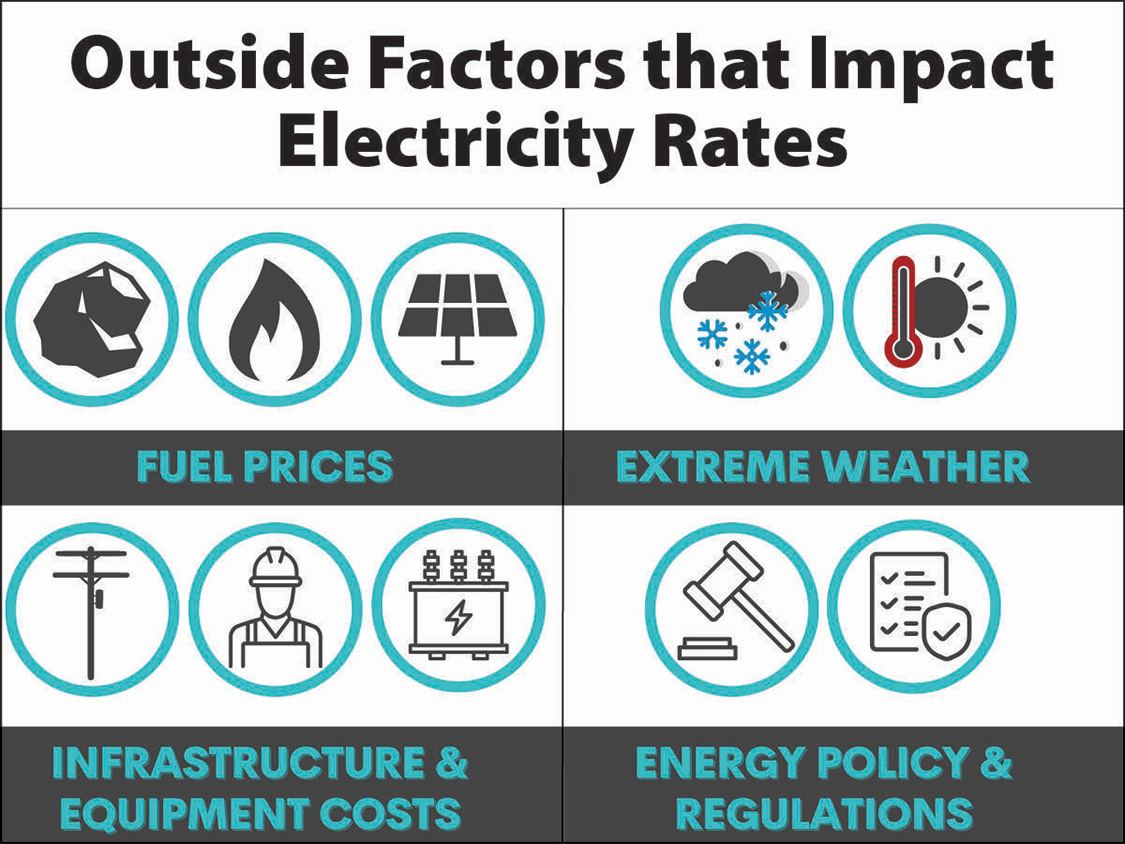 By Shawn Dorflinger, Manager
By Shawn Dorflinger, Manager
February brings some of the coldest weather of the year. As our home heating systems work harder and longer to keep us warm, we typically see higher energy bills. There are a few key factors that affect electricity usage, as well as a few ways you can make a meaningful impact on home energy savings.
When you receive your monthly bill, you’re provided with a summary of how much electricity you used during the billing cycle. You can also see how electricity consumption spiked on colder days or when relatives visited.
But you might be surprised to learn that beyond monthly energy consumption, there are external factors that can impact the cost of electricity.
Fuel Prices
Ouachita Electric purchases electricity from our wholesale generation electric cooperative, Arkansas Electric Cooperative Corporation (AECC), then we deliver power to our local communities. The cost of generating and transmitting electricity from AECC accounts for a significant portion of the cost to provide electric service to local homes and businesses. The cost of fuels used to generate that electricity, such as natural gas, fluctuates based on supply and demand. While these fluctuations can impact the cost of electricity, we work closely with AECC to plan and help stabilize the cost to our members.
Extreme Weather
As everyone knows, no one can control the weather. However, we review weather patterns and forecasts to prepare for increased electricity demand. When temperatures become extremely cold or hot and the demand for electricity spikes, the price can also increase.
Infrastructure and Equipment
To cover the costs associated with providing electricity to homes or businesses, members pay a monthly service availability charge. This flat monthly fee ensures the cost of equipment, materials, labor and daily operations are covered. To ensure the reliable service members expect and deserve, we must maintain the local grid, including power lines, substations and other equipment.
Energy Policy and Regulations
Federal energy policies and regulations can have a profound impact on electricity costs. As energy shifts to intermittent sources and stricter regulations for reliable resources like natural gas and coal increase, costly upgrades and new facilities are needed. These additional costs are ultimately passed on to you.
As the demand for power consumption continues to increase, electric cooperatives are working with members of Congress to advocate for common-sense energy policies.
You Have Control
While many external factors that impact electricity costs are out of our control, you have the power to manage energy use at home. Since heating and cooling account for a major portion of home energy use, adjusting the thermostat to the lowest comfortable setting can help save energy and money. Service your heating and cooling system annually, and replace dirty filters as needed.
Reduce energy use by taking advantage of off-peak periods, when the demand for electricity is lower. Reserve energy-intensive chores for off-peak times, such as early mornings or late evenings. Seal air leaks around windows, doors and other areas where gaps are possible to help your heating and cooling system work less.
As always, we continue to work diligently to provide reliable power at an affordable cost.
February 5, 2025
Energy Bills ‘Boil’ Down to One Thing — Heat
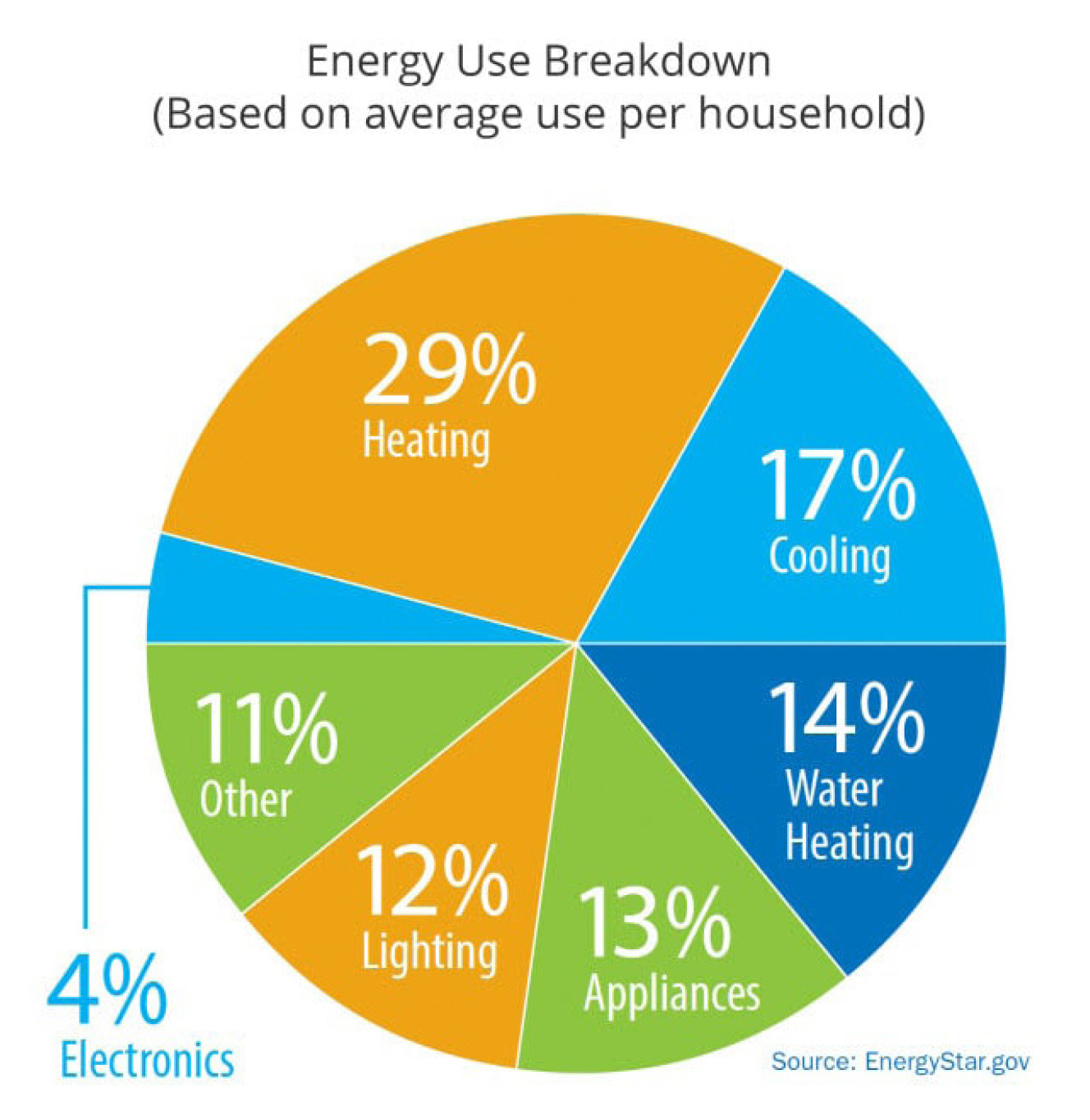
By Mitch Ross
This pie chart can help people understand their energy bill and how different equipment contributes to the overall energy use in their home. It is very helpful for people to see what the big energy users are so that they can focus their efforts on reducing energy consumption in these categories.
Heating, cooling and water heaters are always top of the list for me when I’m helping someone lower their bill. Although 46% of the bill may be heating and cooling, 14% water heating, 13% appliances, and so on, if you add it up, nearly 100% of energy use “boils” down to one concept: heat.
The energy required to create or move heat directly impacts your energy bill!
How Heat Moves
Heating: Heat is either moved via a heat pump refrigeration cycle or created via a type of friction in electric resistance heat.
Cooling: Your air conditioner is also simply moving heat. Via a refrigerant cycle, heat is “picked up” from inside the home and transferred to the outside.
Water Heating: Heat is created via resistance or transferred via heat pump, typically to a tank of water.
Refrigerators: Heat is gathered from inside and moved out through a refrigeration cycle.
Appliances: From washing and drying clothes, washing dishes, cooking and so on, most of the energy consumed deals with creating or moving heat.
Other: Electronics such as lights, fans and plug-in devices typically consume more energy via heat as a byproduct than their actual intended uses.
Why dwell on this? Understanding this concept can help you adopt practices and solve problems that even an energy auditor might not pick up on in a visit to your home. For example, if you put hot food in a refrigerator, you are using energy to transfer that heat to the outside of the fridge. By simply waiting until it cools off, you would use less energy.
Also, if you use a lot of candles or candle warmers in the summer, you are paying extra on your bill to remove that created heat out of the home by way of the air conditioner. Doing these and other heat-creating activities, such as baking heavier dishes in the cooler months, will help reduce your annual energy use.
By focusing on the concept of heat, I’ve been able to find other creative ways to further lower my energy use, and my hope is that this focus can help you as well!
Mitch Ross is the energy efficiency manager for the Electric Cooperatives of Arkansas.
January 7, 2025
Spreading Holiday Cheer: Ouachita Electric Employees Give Back Through Angel Tree Program

During the month of December, employees at Ouachita Electric actively participated in charitable initiatives by purchasing gifts to support the Angel Tree program and students from local schools. We are sincerely grateful for the dedication of our employees to giving back to the community.
January 7, 2025
Celebrating Dedication: Ouachita Electric Honors Employees at Annual Christmas Party

Ouachita Electric Cooperative held its annual Christmas Party on Tuesday, December 17th. The following awards were given to employees to honor their years of service:
- Awards 5 Years: Eric McGee, James Steed, Kari Strickland
- 10 Years: Jamie Brown, Jared Lampkin, Derek Sanders
- 15 Years: Tiffanie Hildreth
- 20 Years: Angie McLendon
- 25 Years: Andrea Turner
- 30 Years: Shawn Dorflinger, Richard Freeland
January 7, 2025
Christmas Card Contest Winners Announced
Congratulations to our outstanding young artists!
 |
 |
 |
| Riley Anderson 5th Grade Harmony Grove Elementary School |
Riley Richardson 4th Grade Harmony Grove Elementary School |
3rd Grade Fairview Elementary School |
January 7, 2025
The Fast-Growing Demand for Electricity
How increasing power needs affect electric co-ops, our members

Less than a century ago, when rural electric cooperatives first strung power lines from house to house and farm to farm, most members had but a handful of light bulbs to power. With time, they added water pumps, appliances and other electronics, but they couldn’t begin to imagine the number and variety of electrical devices in today’s homes, farms and garages.
Across the U.S., people use a growing amount of electricity at work, at home and, with the growth of electric vehicles (EVs), even on the road.
The demand for electricity increased by 2.5% in 2024 and is expected to grow by 3.2% this year. That was after electric cooperatives saw a 4.8% increase in 2022. Through 2029, the nation’s peak demand is projected to grow by 38 gigawatts. That would be like adding another California-sized state to our nation’s power grid.
The rapid growth of artificial intelligence (AI) is driving the development of massive data center facilities, often placed in electric cooperative service territories to take advantage of inexpensive land and fewer neighbors to complain. By 2022, these facilities accounted for 2.5% of the nation’s consumption of electricity — and by 2030, they’ll use 7.5% of all electric power.
Data centers and facilities like warehouses require a large, steady supply of electricity 24 hours a day. That means the electric cooperatives supplying them can’t rely on intermittent sources of electricity such as solar or wind energy to handle the additional load. Instead, they need more of what’s known as readily dispatchable or always-available power. The more we depend on technology, the more we’ll need reliable baseload generation.
Yet that’s a problem, because at the same time Americans are using more electricity, power providers are being forced to shut down reliable sources of baseload power such as coal and nuclear power plants. Many large coal plants have been converted to use natural gas, but others have been deemed too costly to convert and are prematurely being shut down. More than 110 gigawatts of always-available generation — enough to power about 35 million homes — are forecast to retire by 2033.
As part of the Electric Cooperatives of Arkansas, we are committed to fulfilling our mission to provide our members with reliable, affordable power in a responsible manner. We are investing in new generation projects that will provide 24/7/365 readily dispatchable energy resources for the 1.2 million members served by Arkansas’ 17 electric distribution cooperatives.
January 7, 2025
Ouachita Electric Director Receives Award
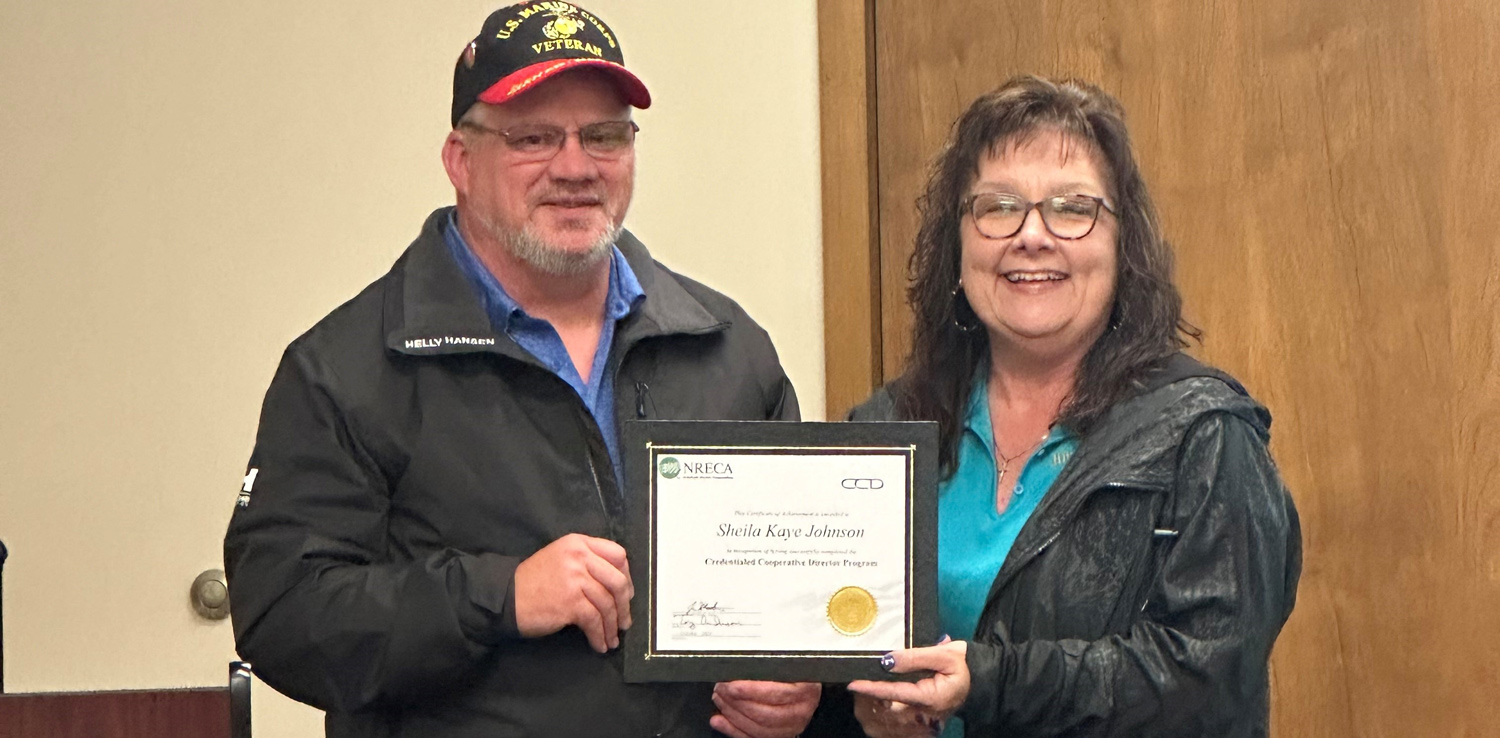
Ouachita Electric Manager Shawn Dorflinger presents Sheila Johnson, board member, with a certificate for completing the Credentialed Cooperative Director Program.
Sheila Johnson, a member of Ouachita Electric’s board of directors representing District 7, has completed the National Rural Electric Cooperative Association’s (NRECA) Credentialed Cooperative Director Program and received a certificate for her achievement.
Thank you, Sheila, for your unwavering commitment to the continuous improvement of Ouachita Electric.
December 10, 2024
Christmas Card Winners
Ouachita Electric hosted a contest for local elementary schools to design our cooperative Christmas Card.
We are pleased to announce the winners below!
.jpg) |
.jpg) |
.jpg) |
| Riley Anderson 5th Grade Harmony Grove Elementary School |
Riley Richardson 4th Grade Harmony Grove Elementary School |
3rd Grade Fairview Elementary School |
December 3, 2024
Youth Leadership Spotlight: Emma Tuberville Highlights Land Ownership Challenges for Arkansas Electric Cooperatives
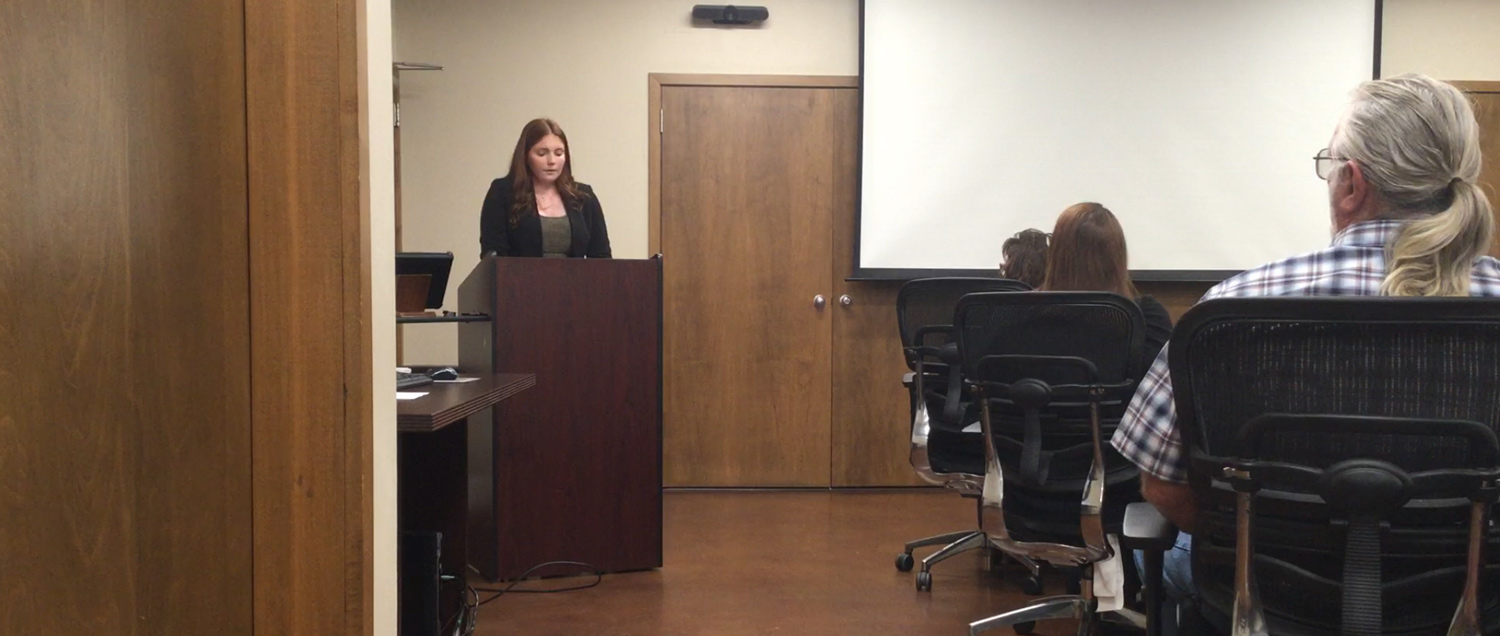
Emma Tuberville, a youth tour delegate from Ouachita Electric participating in the National Rural Electric Cooperative Association (NRECA) Youth Leadership Council, addressed the cooperative board during their meeting on Thursday, November 21st. In her presentation, Emma provided valuable insights into agricultural land ownership in Arkansas and examined its implications for electric cooperatives throughout the state. We extend our gratitude to Emma for enlightening the Ouachita Electric staff and board of directors on the significant land-related issues facing Arkansas.
December 2, 2024
Kelly Belt Appointed as Director for District 2

Kelly Belt was recently appointed to serve on the Ouachita Electric Cooperative’s Board of Directors, representing District 2. She is a lifelong resident of Ouachita County and a 1995 graduate of Fairview High School. She has an associate of arts degree from Southern Arkansas University Tech.
Kelly is a 26-year employee of L3 Harris-Aerojet Rocketdyne where she currently serves as a senior associate, configuration management in the engineering department. She is a member of Liberty Methodist Church. Kelly is married to Brandon Belt, and they share two children, Austin and Gracie Belt. Kelly
is the daughter of the late Jim Garner who also served on Ouachita Electric’s Board of Directors. In her free time, Kelly enjoys camping and spending time with her family.
December 2, 2024
Public Notice of Rate Adjustment
Notice is hereby given that the Board of Directors of Ouachita Electric Cooperative Corporation has approved to adjust the Cooperative’s rates in an amount equal to a system rate increase of 6.5% which includes a 5% system rate increase under Act 821 procedures and a 1.5% pass-through of power supply costs under the provisions of Act 676 to be effective on usage for the following rate schedules. Each percentage of increase equals to approximately $1 added to electric bills.
Ouachita Electric has not had a rate increase since 2010. In 2019, Ouachita Electric had a rate decrease of 4.5%.
Rate Schedule: 1 - Residential
| Availability | $25.00 |
| Minimum Bills | $33.00 |
| All kWh | $0.115688 |
| Purchased Power Transmission Demand and RTO | $0.00005 |
| Energy Cost Adjustment | $0.00062 |
| Cost of Debt Adjustment | -$0.00143 |
Rate Schedule: 2 - Commercial & Industrial
| Availability | $42.50 |
| All kWh | $0.115688 |
| Purchased Power Transmission Demand and RTO | $0.00002 |
| Energy Cost Adjustment | $0.00035 |
| Cost of Debt Adjustment | -$0.00139 |
Rate Schedule: 3 - Large Power < 250 kw
| Availability | $76.50 |
| Demand Charge | $5.86 |
| First 150 kWh/kW | $0.091433 |
| Next 150 kWh/kW | $0.081433 |
| Over 300 kWh/kW | $0.071433 |
| Purchased Power Transmission Demand and RTO | -$0.00001 |
| Energy Cost Adjustment | -$0.00022 |
| Cost of Debt Adjustment | -$0.00135 |
Rate Schedule: 3 - Large Power > 250 kw
| Availability | $230.00 |
| Demand Charge | $5.86 |
| First 150 kWh/kW | $0.091433 |
| Next 150 kWh/kW | $0.081433 |
| Over 300 kWh/kW | $0.071433 |
| Purchased Power Transmission Demand and RTO | -$0.00003 |
| Energy Cost Adjustment | -$0.00045 |
| Cost of Debt Adjustment | -$0.00129 |
Rate Schedule: 4,5 - Security and Municipal Lighting Security (Unmetered)
| 175 Watt MV | $10.92 |
| 175 Watt MV, Shielded | $11.59 |
| 250 Watt MV | $12.57 |
| 400 Watt MV | $17.66 |
| 1000 Watt MV | $41.24 |
| 100 Watt HPS | $8.99 |
| 100 Watt HPS, Shielded | $9.57 |
| 150 Watt HPS | $11.62 |
| 250 Watt HPS | $14.39 |
| LED 100 Watt HPS Equivalent | $7.76 |
| LED 100 Watt HPS Equivalent, Shielded | $8.45 |
| LED 400 Watt HPS Equivalent | $12.69 |
Security (Metered)
| 175 Watt MV | $6.11 |
| 175 Watt MV, Shielded | $6.80 |
| 250 Watt MV | $7.09 |
| 400 Watt MV | $8.91 |
| 1000 Watt MV | $19.34 |
| 100 Watt HPS | $6.82 |
| 100 Watt HPS, Shielded | $7.52 |
| 50 Watt HPS | $8.31 |
| 250 Watt HPS | $10.10 |
| LED 100 Watt HPS Equivalent | $6.82 |
| LED 100 Watt HPS Equivalent, Shielded | $7.46 |
| LED 400 Watt HPS Equivalent | $8.91 |
Municipal Street Lighting
| 100 Watt MV | $6.57 |
| 175 Watt MV | $9.73 |
| 175 Watt MV, Shielded | $10.47 |
| 250 Watt MV | $13.20 |
| 400 Watt MV | $20.03 |
| 1000 Watt MV | $43.07 |
| 100 Watt HPS | $6.57 |
| 100 Watt HPS, Shielded | $7.30 |
| 250 Watt HPS | $12.99 |
| 400 Watt HPS | $19.71 |
| LED 100 Watt HPS Equivalent | $5.17 |
| LED 100 Watt HPS Equivalent, Shielded | $5.64 |
| LED 400 Watt HPS Equivalent | $14.10 |
The above proposed rates will become effective for bills rendered on or after April 1, 2025, unless on or before such effective date petitions from ten percent (10%) of the member-consumers have been received by the Arkansas Public Service Commission. Petitions should be sent to: Arkansas Public Service Commission, 1000 Center Street, Little Rock, Arkansas, 72201, the mailing address of which is: P.O. Box 400, Little Rock, Arkansas, 72203-0400.
November 26, 2024
Congratulations to Sheila Johnson on Earning Credentialed Cooperative Director Certification!

We are proud to announce that Sheila Johnson has been awarded her certificate for completing the prestigious Credentialed Cooperative Director (CCD) Program! This accomplishment highlights her dedication to enhancing her leadership skills and strengthening her knowledge of cooperative governance.
The CCD Program, a highly regarded training initiative through the National Rural Electric Cooperative Association (NRECA), prepares directors to effectively guide and support their cooperatives in today's evolving energy landscape. Sheila's achievement reflects her commitment to serving the members of Ouachita Electric Cooperative with excellence.
Please join us in congratulating Sheila on this significant milestone in her cooperative leadership journey!
November 5, 2024
Ouachita Electric Brings Willie Wiredhand to Downtown Camden: Congrats to Prize Winner Kylie Burchfield!

In October, Ouachita Electric took part in the business scarecrow contest in downtown Camden, showcasing Willie Wiredhand. In addition to the contest, Ouachita Electric organized a prize drawing for community members who submitted their photos with Willie. We are thrilled to announce that the winner of the drawing is Kylie Burchfield! Congratulations, Kylie, and thank you to everyone who participated by sending in their photos!
November 4, 2024
Ouachita Electric’s Youth Delegate Leads Community Food Drive to Support Local Children

Emma Tuberville, the Youth Tour Delegate from Ouachita Electric, was selected to serve on the National Rural Electric Cooperative Association (NRECA) Youth Leadership Council in June of this year. As part of her responsibilities in this esteemed position, Emma was tasked with developing a community service project of her choosing, supported by her sponsoring cooperative.
Emma elected to focus her project on a food drive benefiting the HUB of Ouachita County’s local backpack program. This program, which commenced in 2016, provides essential food supplies to children in need each Friday at local schools.
Through the collaborative efforts of Ouachita Electric and generous community contributions, Emma successfully supplied the HUB with a substantial quantity of food, along with a $500 donation aimed at supporting the backpack program.
We at Ouachita Electric take great pride in Emma’s achievements and extend our sincere gratitude to all those who contributed to her project.
November 1, 2024
Capital Credits Returned to Members
Your Ouachita Electric Cooperative Corporation (OECC) will retire $750,000 in capital credits to its members from patronage received in years 1997 and 2023.
OECC is a not-for-profit, member-owned electric company, providing electrical service to its members. Abiding by one of the seven Cooperative Principles: Member Economic Participation, the cooperative’s board of directors determines the allocation of capital credits back to the members, based on the members’ patronage. Capital credits are just one of the many differences that set cooperatives apart from other business models.
How the process works:
-
Cooperative members use electricity provided by Ouachita Electric.
-
Ouachita Electric tracks members’ electricity use and patronage.
-
Year-end accounting and audit are completed. Financial obligations of the cooperative are met.
-
The board approves the portion of the margins to be distributed to the members.
-
Checks are issued each November to qualifying Ouachita Electric members.
* In addition to our traditional capital credit retirement checks, this year we will offer to retire estates. If you are the executor/trustee/beneficiary of an estate and are currently receiving a yearly check on that inactive account, please contact our office at (870) 836-5791. The Ouachita Electric board has set a limit to be used to pay out estates over the next year. Once that dollar limit is reached, we will start a waiting list for our next retirement.
Cooperative Definitions:
Member: At the cooperative, you are more than a customer, you are a member-owner.
Operating Costs: The cost to maintain, report and construct the electrical system and to deliver electrical service to its members.
Margin: At the end of the year, OECC subtracts the operating expenses from the amount collected and the balance is called the margin.
Patronage: At the cooperative, your patronage is the amount of money you pay to OECC on your electric bill each year.
Allocation: The process of distributing each members’ portion of margin based on the total kilowatt hours (kWh) purchased that year.
Retire: A payout of money representing capital credits from your capital credit account.
Estate: Arkansas law requires that capital credits of a deceased member will pass to the probate estate for distribution, or if no probate estate, then to his/her heirs at law. Proof of heirship will be required. If funds are available for retirement, the capital credit retirement will be paid to the executor/trustee/beneficiary of the estate, or if no probate estate, then payment will be made to the deceased members’ heir at law. Proper paperwork will be required showing the authority to request the distribution.
October 7, 2024
Ouachita Electric Stands Together for Breast Cancer Awareness Month – Honoring Strength and Support!
Ouachita Electric is proud to support Breast Cancer Awareness Month! Join us in raising awareness and showing support for all those affected by breast cancer.
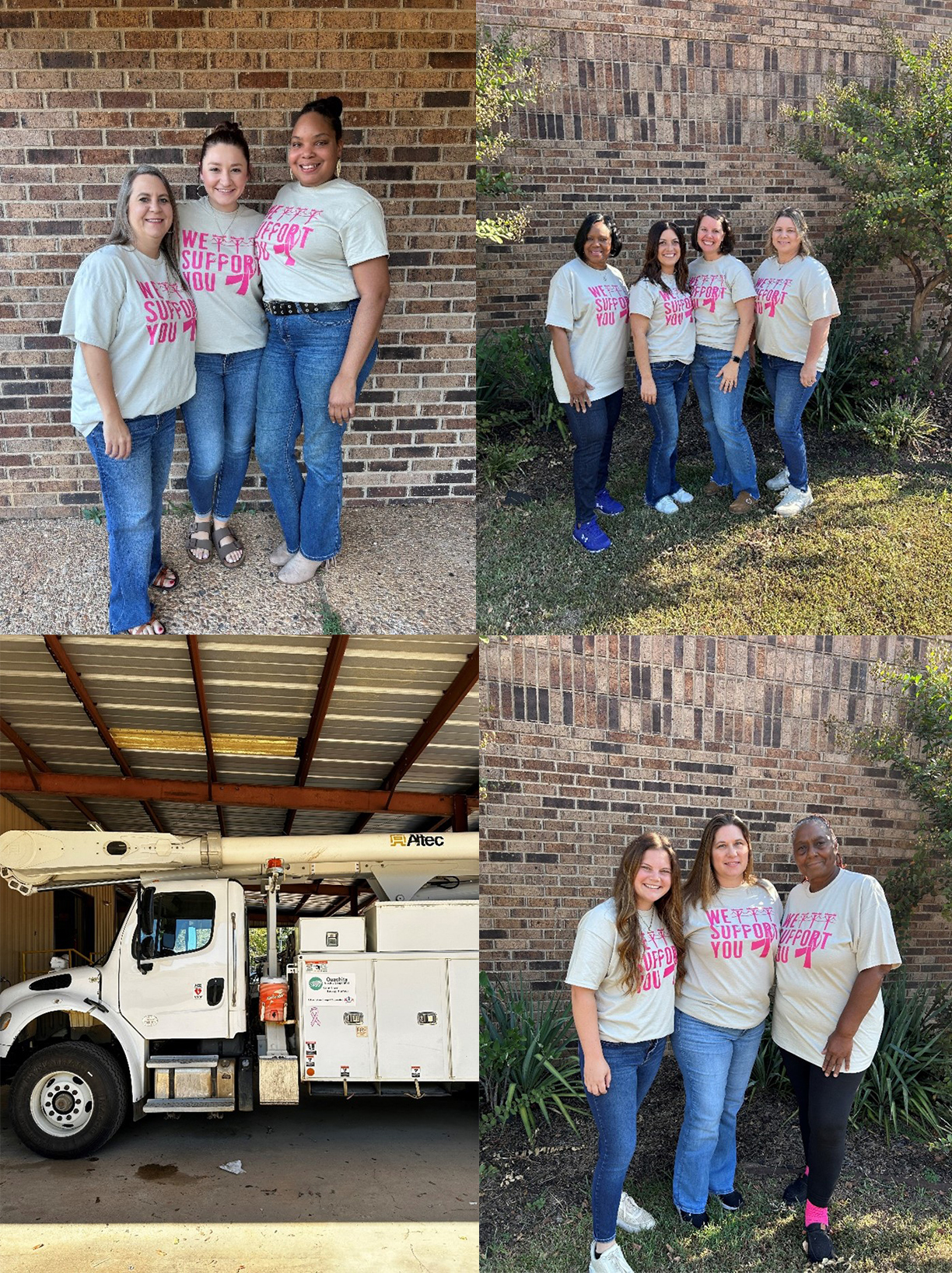
October 7, 2024
Family Fun Day at Ouachita County Sheriff's Office
Ouachita Electric had the honor of conducting safety demonstrations at the Ouachita County Family Fun Day on Saturday, October 5th.
Thank you, Ouachita County Sheriff's Department, for organizing this outstanding community event.
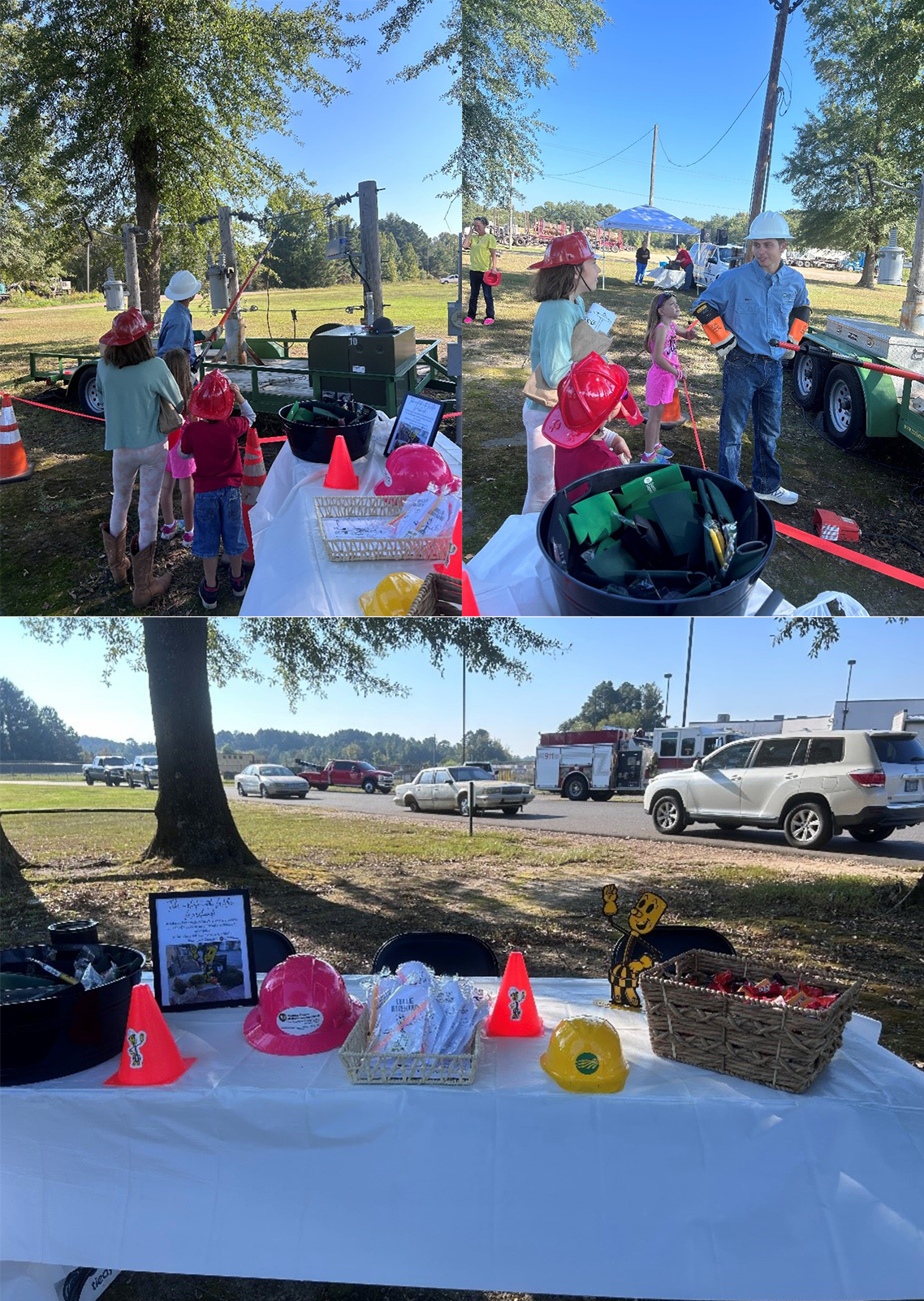
October 7, 2024
Capture the Moment with Willie Wirehand in Downtown Camden – Enter to Win!
Don't forget to swing by downtown Camden and snap a picture with Willie Wirehand! Send your photo using the QR code to be entered into a drawing for a prize!

October 7, 2024
Join Ouachita Electric at the 2024 Boo Bash Camden's Night Out – Candy, Fun, and Community!

Ouachita Electric will be hosting a booth at the 2024 Boo Bash Camden’s Night Out! Our booth will be handing out candy on October 31st from 4:30 p.m.-7 p.m.
Come on out and be sure to stop by!
October 1, 2024
October is National Co-op Month
Electric cooperatives are not-for-profit, community-led utilities. Because we are a co-op, we can adapt to our local members' needs, providing the programs and services you care about most. That's the power of co-op membership.

October 1, 2024
In Memory of Jim Garner
Ouachita Electric Cooperative Director James “Jim” C. Garner passed away peacefully on Aug. 23. Mr. Garner played an integral role as a director, demonstrating unwavering commitment and leadership throughout his tenure.
In addition to his service on the board, he was a member of the Sulphur Springs Community Church, a respected president of the Ouachita County Farm Bureau and an active participant in various organizations, such as the VFW, the Ouachita County Fair Board and the Ouachita County Cattlemen’s Association.
Our heartfelt thoughts and condolences go out to his family, friends and others impacted by this profound loss.

September 25, 2024
Ouachita Electric and Scott Davis Bring Electrical Safety Magic Show to Local Elementary Schools
 |
 |
In September, Ouachita Electric, collaborating with Arkansas Electric magician Scott Davis, presented an electrical safety magic show at Hampton Elementary School and Camden Fairview Elementary School. We extend our gratitude to Scott Davis for his steadfast dedication to imparting knowledge about electrical safety to the younger generation in our community.
September 3, 2024
Go Above and Beyond for a Safe Harvest
Massive machinery is indispensable to farming, but the same impressive size and extensions make them particularly vulnerable to contacting power lines. That’s why staying alert, focused and knowledgeable about potential hazards and safety procedures is crucial.
During a busy harvest season, the familiar sights around the farm can easily fade into the background, and farm workers can overlook the power lines overhead. However, failing to notice them can lead to deadly accidents.
Complete awareness
Awareness of your surroundings — around, above and below — and planning safe equipment routes can significantly reduce the risk of accidents. Even with GPS and auto-steering, it’s imperative that farm workers keep a close eye on the equipment’s location and are ready to take action if necessary.
Exposed underground power lines, defective wiring in farm buildings and extension cords are also hazards. Grain bins can pose a potential danger as well. The National Electrical Safety Code requires power lines to be at least 18 feet above the highest point on any grain bin with which portable augers or other kinds of portable filling equipment are used.
Smart harvest safety tips
To ensure a safer harvest season, SafeElectricity.org recommends the following tips to avoid electrical accidents on the farm:
- Exercise caution near power lines. Be careful when raising augers or the beds of grain trucks around power lines.
- Use spotters when operating large machinery near power lines. Ensure the spotters do not touch the machinery while it is moving near power lines.
- Lower equipment extensions, portable augers or elevators before moving or transporting equipment. Do not raise equipment, such as ladders, poles or rods, into power lines. Remember that non-metallic materials like lumber, tree limbs, ropes and hay can conduct electricity, especially when damp, dusty or dirty.
- Never attempt to raise or move power lines to clear a path. Doing so could result in electric shock or death.
- Avoid using metal poles inside bins. Don’t use metal poles to break up bridged grain inside or around bins.
- Hire qualified electricians. Ensure that qualified professionals handle work on drying equipment and other farm electrical systems.
While rare, the only reason to exit equipment that has come into contact with overhead lines is if the equipment is on fire. However, if it happens, jump off the equipment with your feet together and without touching the machinery and the ground at the same time. Then, still keeping your feet together, hop to safety as you leave the area.

September 3, 2024
Board Members Attend State Conference
The board members of Ouachita Electric have demonstrated a commitment to prioritizing growth and fostering ongoing cooperative education. From July 27-30, eight directors attended the 2024 Electric Cooperatives of Arkansas Directors’ Summer Conference in Rogers, showcasing a dedication to professional development and industry engagement.

September 3, 2024
Electrical Safety Tips for Hunters
As you prepare for hunting season, keep in mind that along with general hunting safety, electrical safety should be a priority.
You might be preoccupied and excited about the big hunt, but be aware of power lines. Never place a tree stand on a utility pole or near a power line. Energized lines and related equipment on utility poles can conduct electricity to anyone who comes in contact with them, causing shock or electrocution.
It is ILLEGAL to shoot near or toward power lines, utility poles, transformers or substations. It is a Class D felony, punishable by up to six years in prison, with fines up to $10,000. Stray bullets or pellets could damage equipment, possibly interrupting electric service and causing physical risks to those nearby.
For your safety, follow these additional electrical safety tips:
- Familiarize yourself with the area before heading out to hunt. Take note of power lines and equipment, especially when hunting in densely wooded areas.
- Observe all signs or postings that advise electrical safety, especially when scouting out a location for your tree stand.
- Look up and look out for power lines, and do not come within 10 feet of an overhead line or pole when setting up or taking down a stand.
- Never climb a utility pole.
- Do not place dove decoys on power lines or other utility equipment. Nonelectrical attachments can pose an obstruction and serious hazards to our lineworkers.
For more information about safety around power lines and other sources of electricity, go to SafeElectricity.org.

September 3, 2024
EPA Rule Threatens Electric Reliability
In May, the U.S. Environmental Protection Agency (EPA) issued a rule that impacts energy production from power plants. The power plant rule will undoubtedly threaten access to reliable electricity for our local community and communities across the country.
The rule constrains existing coal and new natural gas plants by requiring them to install carbon capture and storage (CCS) –– a technology that has potential but has not been proven to be viable as required. No power plant in North America currently uses CCS at the scale and levels mandated by EPA. When power plants aren’t able to comply with EPA’s CCS requirements, they will be required to shut down, significantly limit operations or switch fuels. These unrealistic standards will force the unnecessary and early shutdown of many power plants that currently provide reliable electricity 24/7.
Intermittent sources, such as solar and wind, are important components of our Balance of Power generation mix. But given the intermittent nature of these energy sources, we simply cannot depend on them because the wind doesn’t always blow and the sun doesn’t always shine. The need for always-available power generating resources is still essential.
The timing of the power plant rule is equally troubling. At the same time the EPA is leading our nation down the path to fewer power plants, utilities are facing a surge
in electricity demand — driven by the onshoring of manufacturing, the growth of the American economy and the rapid expansion of data centers to support artificial intelligence, e-commerce and cryptocurrency.
Many states have already experienced rolling outages, and if the supply of electricity is further threatened by the EPA’s power plant rule, the problem will only get worse. In fact, the North American Electric Reliability Corporation (NERC), the nation’s electric reliability watchdog, recently forecasted that over the next five years, all or parts of 19 states are at high risk of rolling power outages during normal peak electricity demand conditions.
It’s also no secret that when demand is high and supply is low, costs go up. We’re concerned about threats to reliability as well as cost increases to our members.
Just as electric cooperatives have always done, we will look for solutions that serve our members best. We are joining electric co-ops across the country to fight these regulations, and we are working with our local elected officials to help them understand the consequences this would have on all.
Electric cooperatives deliver power to 42 million Americans. At the end of the day, our top priority is to meet our members’ energy needs, and we must have reliable electricity available to do that.
For more information, visit aecc.com/balance-of-power.

August 5, 2024
Watch the Clock to Lock in Energy Savings
As temperatures rise and summer activities heat up, a reliable flow of electricity is essential to ensure our members stay cool and connected.
August brings some of the most extreme summer temps, which means people will be spending more time indoors to avoid the heat, and air conditioners will work overtime. This increased use of electricity will cause spikes in demand, also known as energy peaks. During peak times, we must work closely with our wholesale power provider to ensure a balanced supply of electricity is always available to meet our cooperative’s energy needs.
When our area experiences extreme summer heat and higher demand for electricity, you
can help by conserving energy. It’s easy –– just check the clock and avoid your energy-intensive activities and chores during peak hours. These peak times are typically in the morning as people start their day and in the evening as people return to their homes.
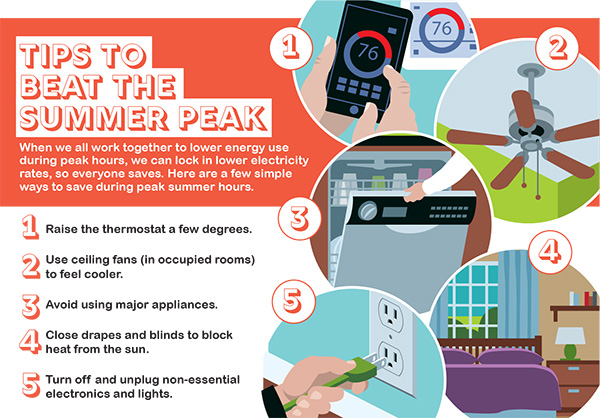
There are many ways to lower your home energy use. Here are a few recommendations to help you save energy (and money) during the summer peak:
-
Adjust the thermostat. Move the temperature up a few degrees in summer, and bump it further up when you’re away from home for extended periods of time.
-
Postpone the use of major appliances. Move laundry loads to later in the evening or weekends. Delay running the dishwasher until well after dinner or use the delay cycle function.
-
Change your times to shower or bathe. Your water heater uses a significant amount of energy. You can reduce its energy burden by moving showering and bathing to an off-peak time or lowering the temperature on the tank.
-
Cook outdoors. During summer, consider grilling outdoors to keep the oven off during peak heat days.
-
Turn off lights and fans. In unoccupied rooms, turn off lights and ceiling fans. Ceiling fans cool people, not rooms.
-
Charge electric vehicles (EVs) overnight. If you have an EV, charge it at night when usage is typically lowest.
-
Unplug electronics when they’re not in use or use smart power strips to manage devices.
-
Close drapes and blinds during the afternoon to block unnecessary heat from sunlight.
When we all work together to beat the summer peak, our entire cooperative benefits. Saving energy during peak times reduces your bills, keeps electric rates lower for all and relieves pressure on the grid.
August 5, 2024
Ouachita Electric Youth Tour Delegate Chosen as State Representative
Ouachita Electric Youth Tour delegate Emma Tuberville of Camden was chosen among her peers to represent Arkansas as the 2024 Youth Leadership Council (YLC) delegate.
She is the first student from Ouachita Electric to ever be chosen as the state’s YLC delegate.
_f250x375_1722890887.jpg)
_f250x375_1722890818.jpg)
LEFT Emma Tuberville of Camden is the 2024 Youth Leadership Council delegate representing Arkansas. RIGHT Youth Tour delegates Austin Belt and Emma Tuberville represented Ouachita Electric Cooperative in Washington, D.C.
Emma spoke at the Electric Cooperatives of Arkansas Summer Directors’ Conference in Rogers last month. She will represent Arkansas at the National Rural Electric Cooperative Association’s 2025 Power Xchange conference in Atlanta. Emma also won a $5,000 college scholarship as YLC delegate.
“I am very grateful to Ouachita Electric,” Emma said. “I can’t wait to represent my state. I plan on going to college, and that’s a big expense, so to be able to receive this scholarship and getting it from this experience makes me feel very blessed and grateful.” Emma said her time spent on Youth Tour was a life-changing experience for her.
“I definitely think one of the most fun parts was coming in, not knowing anybody there and leaving with what felt like my best friends that I’ve known forever,” she said. “Also being in our nation’s capital and getting to see all these historical landmarks was just so surreal. All the things that we see in class, read in books or view on television, it finally came to life.”
A member of Ouachita Electric for her entire life, Emma said she will encourage more students to apply next year for Youth Tour.
“I’ve been telling everybody, all my younger classmates, to apply as soon as they’re able. It’s a trip of a lifetime and something you’ll never forget. I’m beyond grateful to Ouachita Electric for sponsoring me,” she said.
July 30, 2024
Ouachita Electric Board Members Prioritize Growth and Education, Celebrating Emma Tuberville's Historic Achievements
The board members of Ouachita Electric have demonstrated a commitment to prioritizing growth and fostering ongoing cooperative education. Over the past few days, eight directors attended the 2024 Arkansas Board of Directors Summer Conference in Rogers, showcasing a dedication to professional development and industry engagement.
At the center of Ouachita Electric's board members stands Emma Tuberville. Emma participated in the Electric Cooperatives of Arkansas Youth Tour as a delegate representing Ouachita Electric. Throughout the Youth Tour, Emma had the opportunity to explore Washington D.C., and campaign for a position on the National Rural Electric Cooperative Association (NRECA) Youth Leadership Council. Emma successfully secured a place on the Council, becoming the first delegate from Ouachita Electric to attain this accomplishment. In her capacity, Emma will represent Arkansas at the NRECA 2025 Power Xchange conference in Atlanta. Additionally, Emma has been awarded a $5,000 college scholarship as a YLC delegate. We take great pride in Emma and her achievements and are confident she will be a wonderful ambassador for Arkansas.
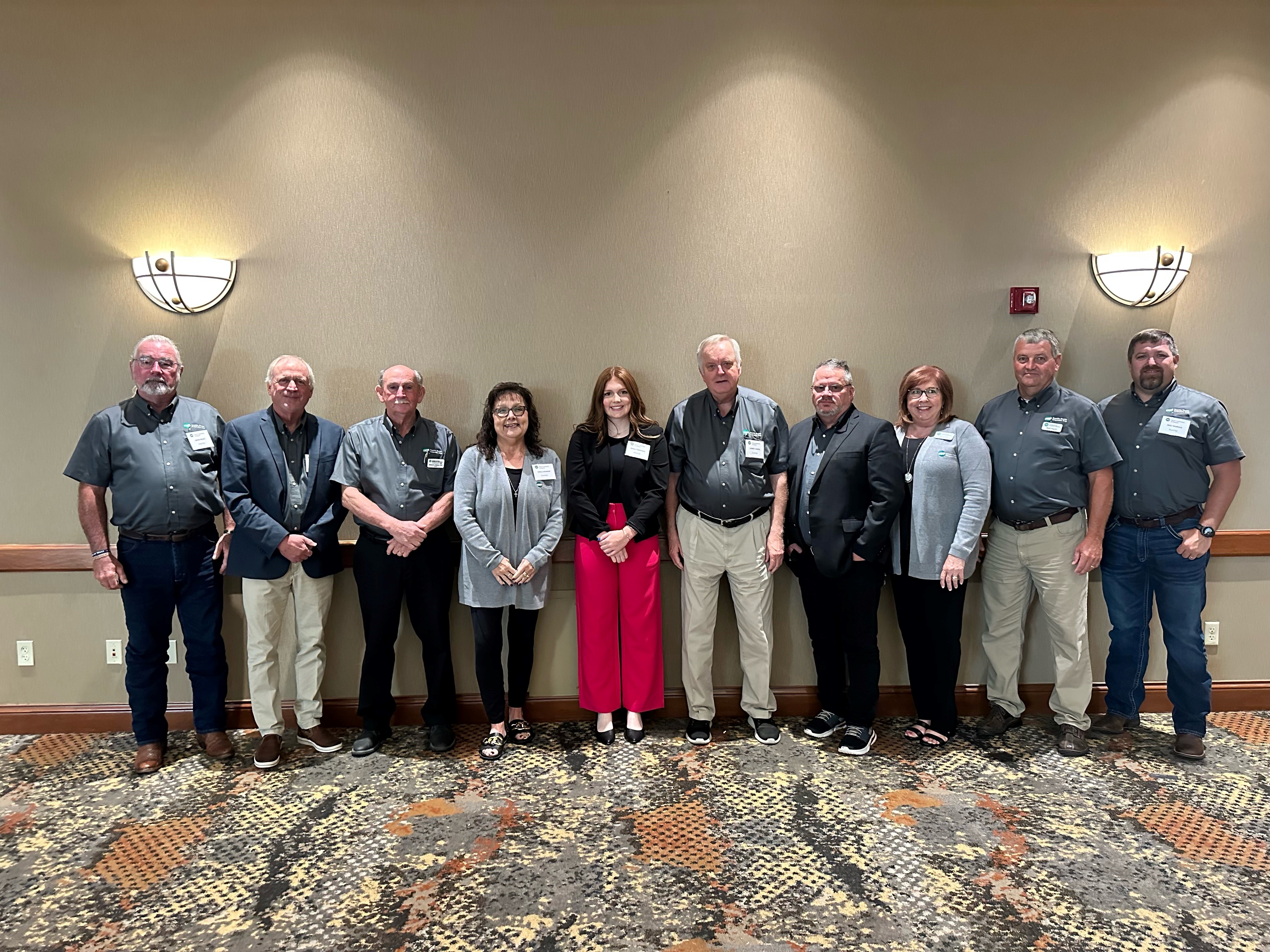
Pictured from left to right:
David Kelley, David McLeane, Danny Adams, Shelia Johnson, Emma Tuberville (NRECA Youth Leadership Council Arkansas State Delegate), Corbet Lamkin, Shawn Dorflinger (OECC General Manager), Lisa Hendrix, Walt Pigott, and Beau Morgan.
July 2, 2024
LIHEAP offers cooling assistance
The Low-Income Home Energy Assistance Program (LIHEAP) can help households stay safe and cool by providing help with paying electric bills in summer months to qualifying individuals and families.
Beginning on July 1, applications are accepted on a first-come, first- served basis, as long as funds are available. Businesses are excluded from receiving the benefit.
LIHEAP is not administered by your local cooperative, but rather through the U.S. Department of Health and Human Services (DHHS). It is operated by Community Action Agencies.
Check eligibility at your local Community Action Agency.
July 2, 2024
10 Things You Might Not Know About Power Restoration
At Ouachita Electric, we’re accustomed to members’ questions about power outages, and why it can take time to get the lights back on. Given our reliance on electricity, there’s simply never a good time to be without it.
We’d like to shed light on our restoration process to help our members understand what may be happening behind the scenes. Here are 10 things you might not know about restoration:
1. We need you. When your power goes out, it might be just at your home or a small section of a neighborhood. There is a chance we may not know about it, and no one has reported it. We rely on you to let us know if your power is out. Report outages by calling (844) 326-4624.
2. Our employees might be affected too. Because we are owned by the members we serve, our employees are local too. They are your neighbors, friends and familiar community volunteers. When you’re without power, our people might be too.
3. It’s a team effort. Every one of our employees are working to get your power restored as soon as possible. Our member services representatives are taking your calls, engineers and field staff are surveying damage, our vegetation management team is clearing hazards, dispatchers are organizing crews, and communicators are keeping everyone informed of progress or potential dangers. When your power goes out, we all work together as quickly and safely as possible to get you back to normal.
4. We assess the situation first. Every outage is different, and we don’t know how dangerous it is or what equipment might need to be replaced. When responding to outages, we first need to see what happened, then figure out what materials we need and a plan for how to fix the problem(s) without compromising electric flow for the rest of our members.
5. Restoration is normally prioritized by the largest number of members we can get back on in the shortest amount of time. Our crews focus on responding first to public safety issues and critical services like hospitals. Then we complete work that impacts the largest number of people first.
6. Our employees face many dangers. Besides working around high-voltage electricity, our crews are on alert for wild animals, weather elements, falling trees and fast-moving cars. (If you ever drive past one of our vehicles, please do so slowly.)
7. Flickering lights are a good thing. Some folks mistake flickering lights for outages, but these “blinks” are important because they indicate our equipment worked and prevented a possible outage likely caused by wayward animals or stray tree limbs on the lines.
8. You need a backup plan. We do our best to help those who need it, but if you depend on electricity for life support purposes, you must have a backup plan — remember, we don’t always know how long restoration efforts will take. If you’re unsure what to do, call us so we can help you prepare an emergency location.
9. Our employees have to plan and eat. If you ever see our trucks in a restaurant parking lot while your power is out, know that sometimes our employees huddle in a safe, common area to map out their plan for getting your power back on. Also, our crews work long, hard hours during outages and need to take time for meals just like everyone else.
10. Sometimes it’s a waiting game. Our portion of the power grid is connected to other electric utilities, and we maintain positive relationships with power providers interconnected to our system. If our outage is due to an issue from their feed into our system, we must let them do their repairs and be mindful of what they’re going through to fix it.
We do our best to avoid power disruptions, but they are inevitable from time to time. If the lights go out, know that your co-op team is working as quickly and safely as possible to restore power.
June 27, 2024
Update on Lockbox Payment Processing Address
As of the current billing cycle, please make note of the change in the address for the processing center handling Lockbox payments. Lockbox payments refer to payments that are sent to the return address specified on the bill.
The revised address for the processing center, which will now be printed on the bill, is as follows:
Ouachita Electric Cooperative
PO Box 70878
Charlotte, NC 28272-0878
If you typically make bill payments by mailing them to the Lockbox, we strongly advise allowing sufficient time for the United States Postal Service to deliver the payment to the updated processing center.
June 5, 2024
Frankie Burchfield retires after 45 years
retired from his position as a right-of-way foreman on April 26. Throughout his tenure, Frankie was known for his friendly and bold personality, and his colleagues appreciated his authentic concern for others. He formed strong bonds with his co-workers, and they were always delighted by his unpredictable yet enjoyable conversations. Frankie was particularly passionate about mentoring summer interns and took pride in seeing new generations take an interest in the energy career field. When asked about his most cherished memories at Ouachita Electric, Frankie mentioned working in major storms and the powerful connections he formed with his colleagues during those times. As he embarks on retirement, Frankie intends to devote his time to gardening, hunting, fishing and savoring a slower pace of life. We thank you, Frankie, for the years of service and long-lasting imprint that you left on the co-op.

Frankie Burchfield (left) is recognized for 45 years of service by General Manager Shawn Dorflinger.
June 5, 2024
Orlando Coon retires after 25 years
On Nov. 15, 1999, Orlando Coon joined Ouachita Electric as a right-of-way worker/tree trimmer.
Throughout his time at the company, Orlando's quiet yet observant personality, wisdom and guidance proved invaluable to his colleagues, helping to shape them into the skilled professionals they are today. His commitment to his faith and strong work ethic made him an outstanding employee and a role model to others.
Orlando shared that what he'll miss most about his time at Ouachita Electric is working with his co-workers, who undoubtedly feel the same way about him.
As he enters retirement, Orlando plans to spend his time fishing, camping and working around his home. It's impossible to fully express the positive impact Orlando has had on Ouachita Electric during his 25-year tenure. Thank you, Orlando, for your eternal contributions to the co-op.

Orlando Coon (left) is recognized for 25 years of service by General Manager Shawn Dorflinger.
June 5, 2024
OECC Economic Impact Analysis
.png)
December 31, 1969
Annual Meeting Held, Directors Elected
Ouachita Electric Cooperative held its Annual Meeting on June 27 at the co-op’s headquarters in Camden.
Three directors were elected to serve three-year terms:
-
Beau Morgan: district four
-
David McLeane: district five
-
David Kelley: district six

Member Mark Perry (left) received a 55-inch television from General Manager Shawn Dorflinger as the grand prize winner of the Annual Meeting prize drawing.
Congratulations to members who won prizes in a drawing of returned Annual Meeting director election ballots:
$100 bill credit – D.K. Higgs
$100 bill credit – Brenda Fickey
$50 bill credit – Logan Strickland
$50 bill credit – William D. Greening
Grand prize winner of 55-inch TV – Mark Perry
To view PDF files on your computer, please click the link below to download Adobe Acrobat Reader.![]()
.png)
My Net - Wildblue and Exede
 Webmail
Webmail  Manage Account
Manage Account